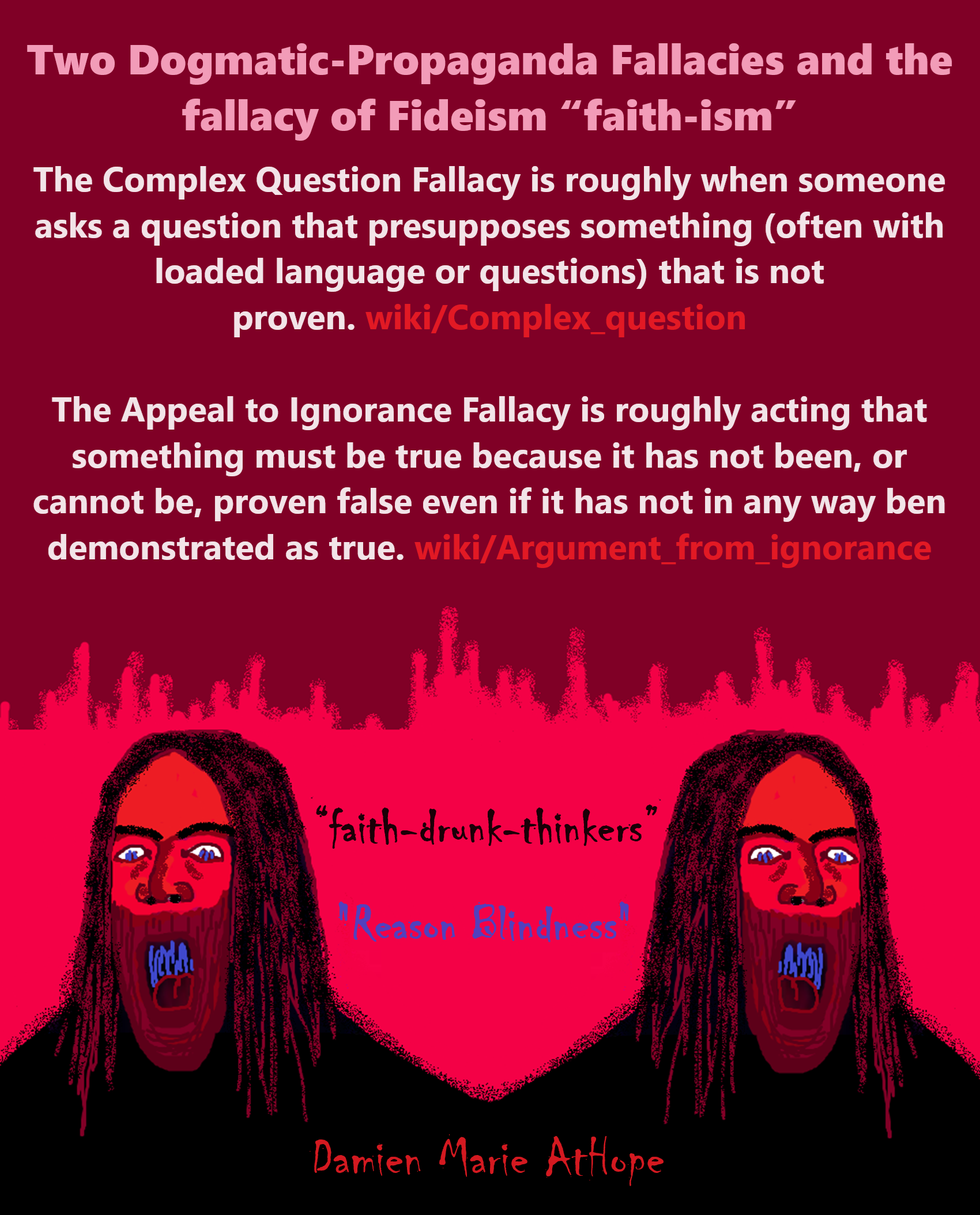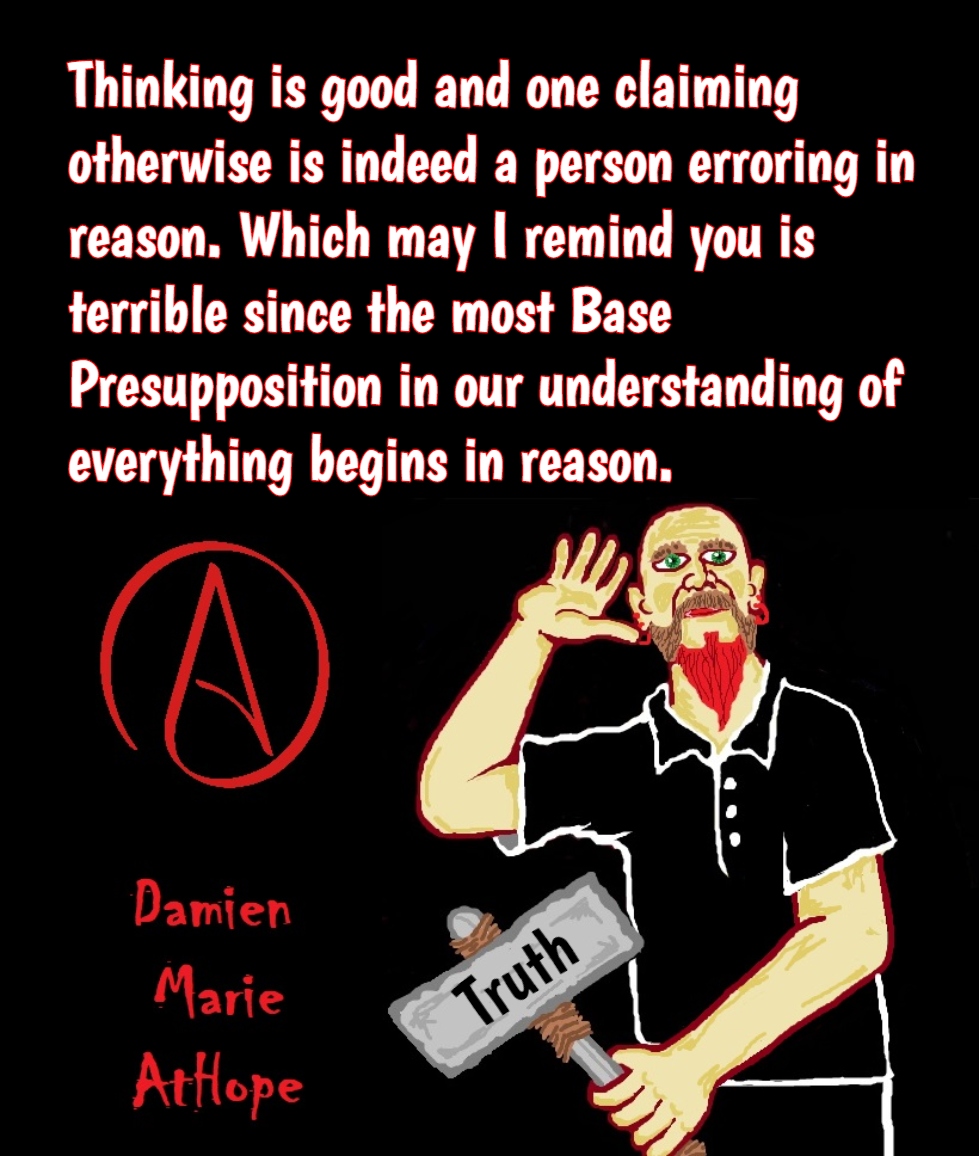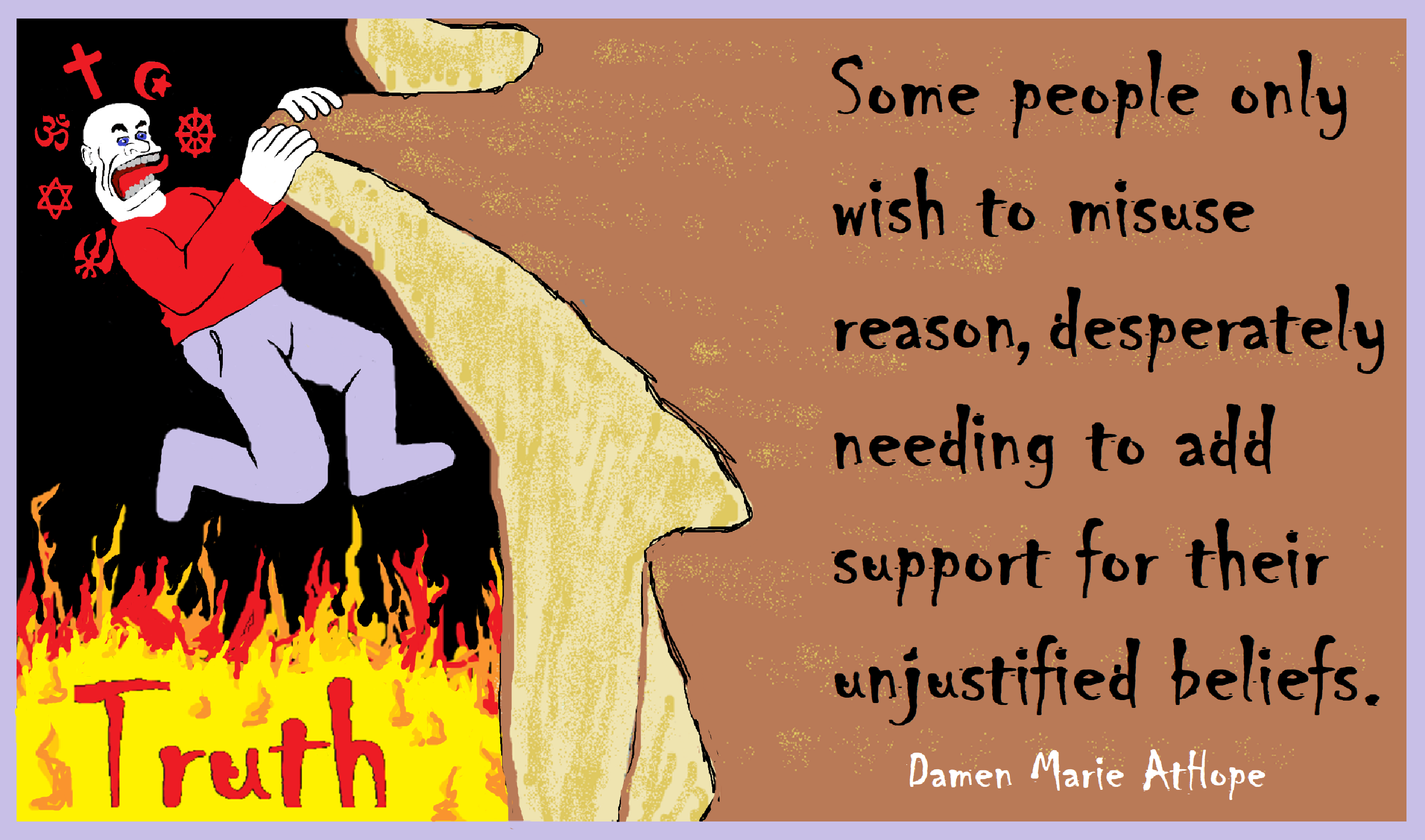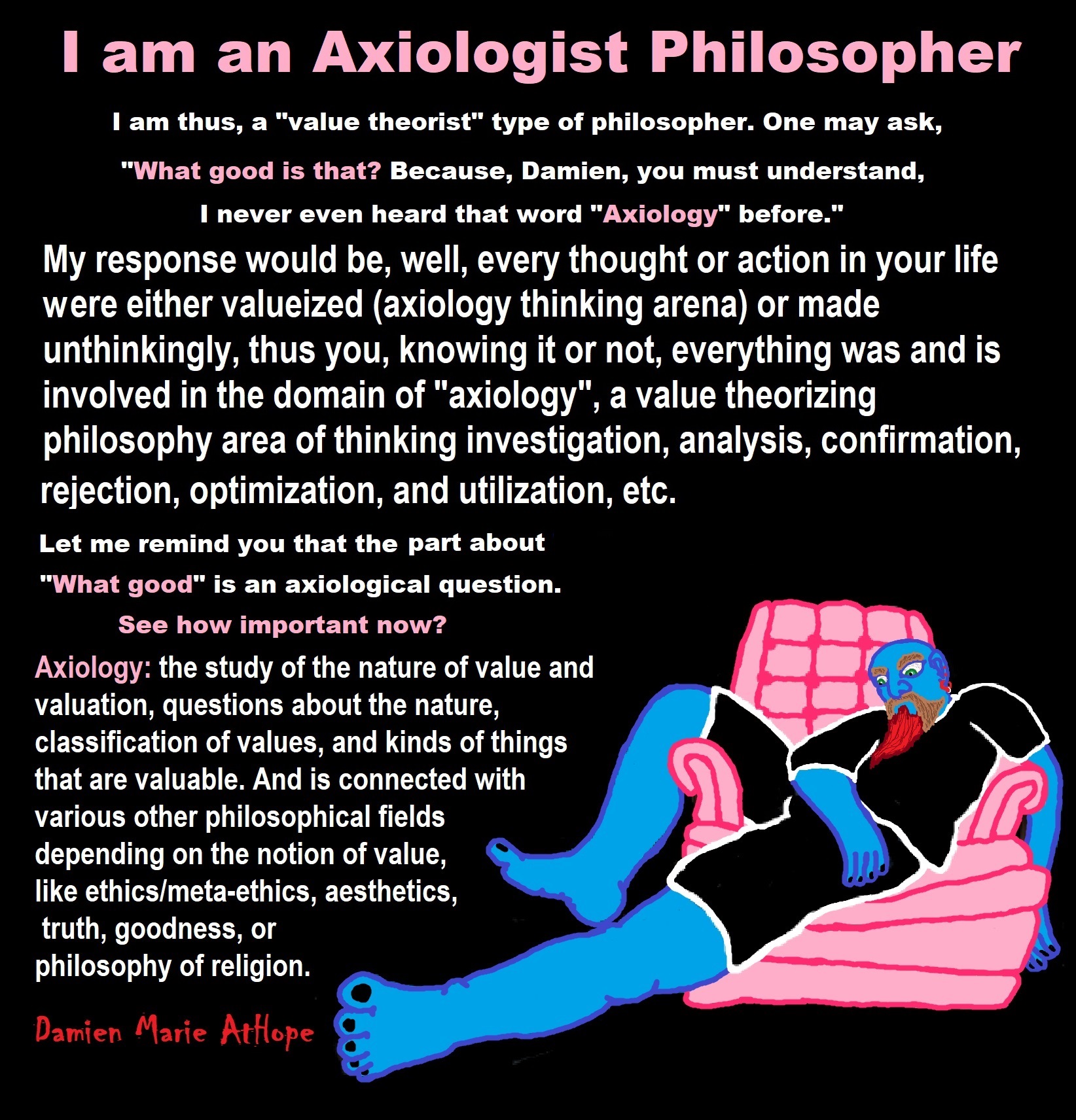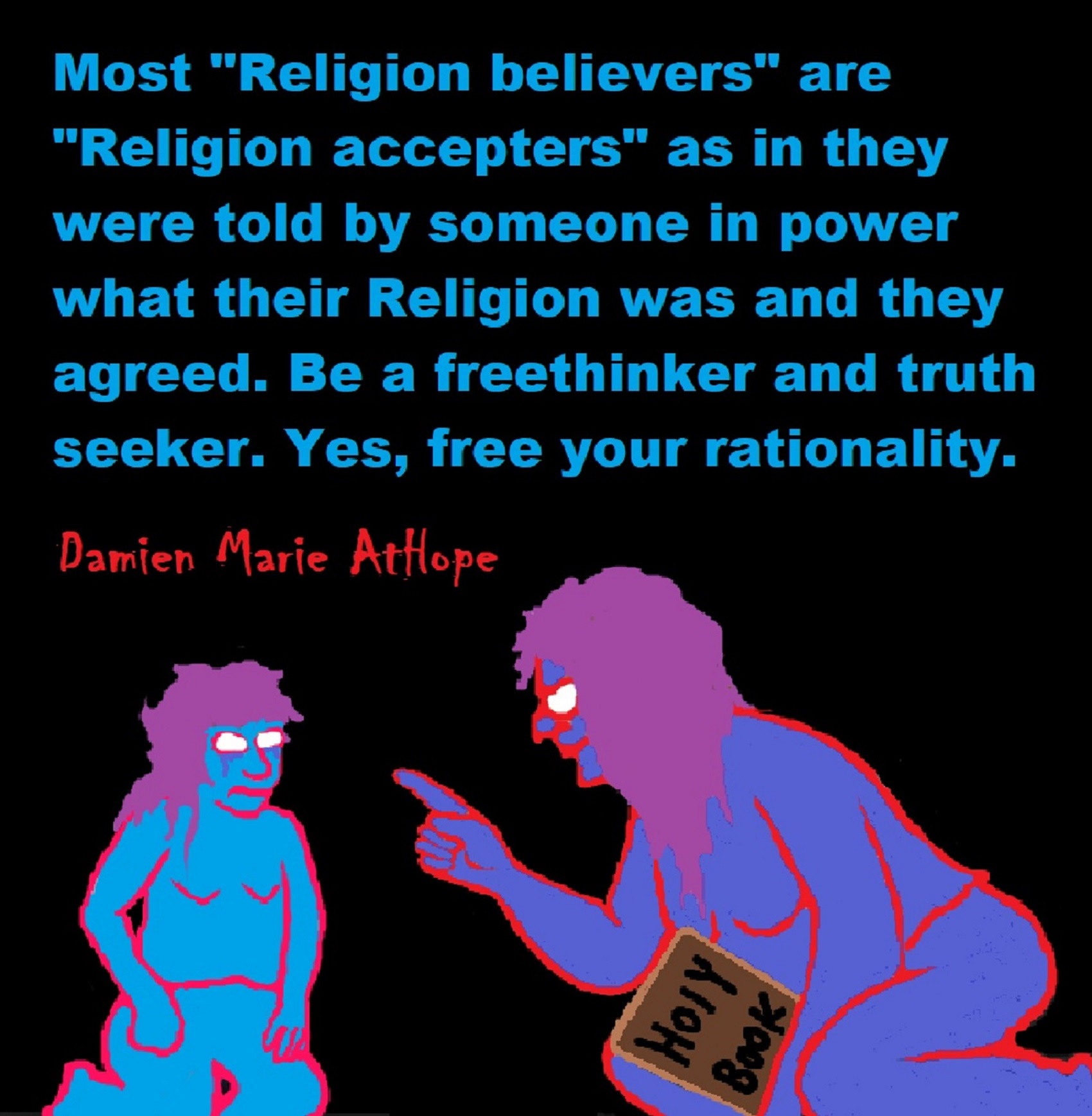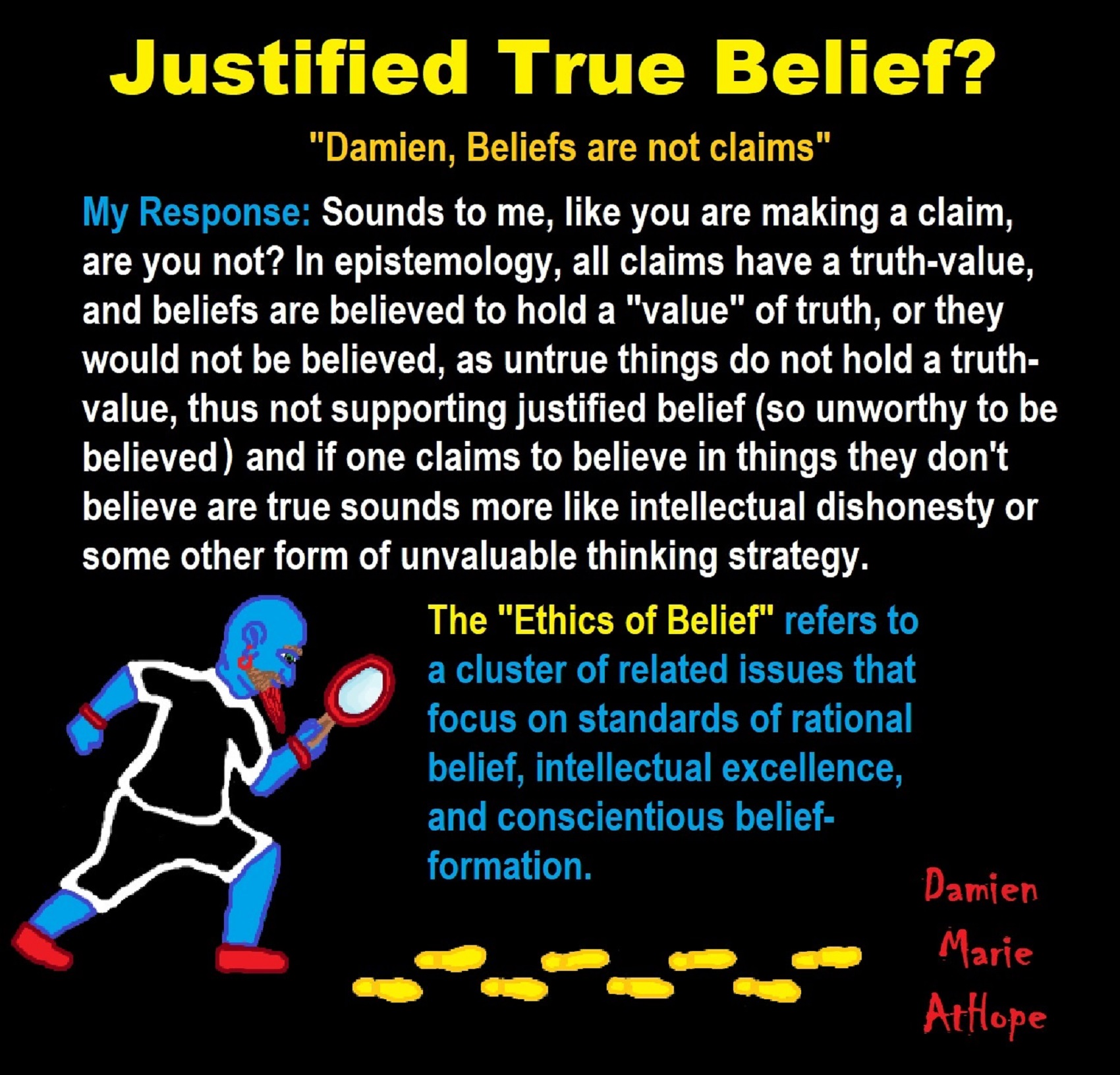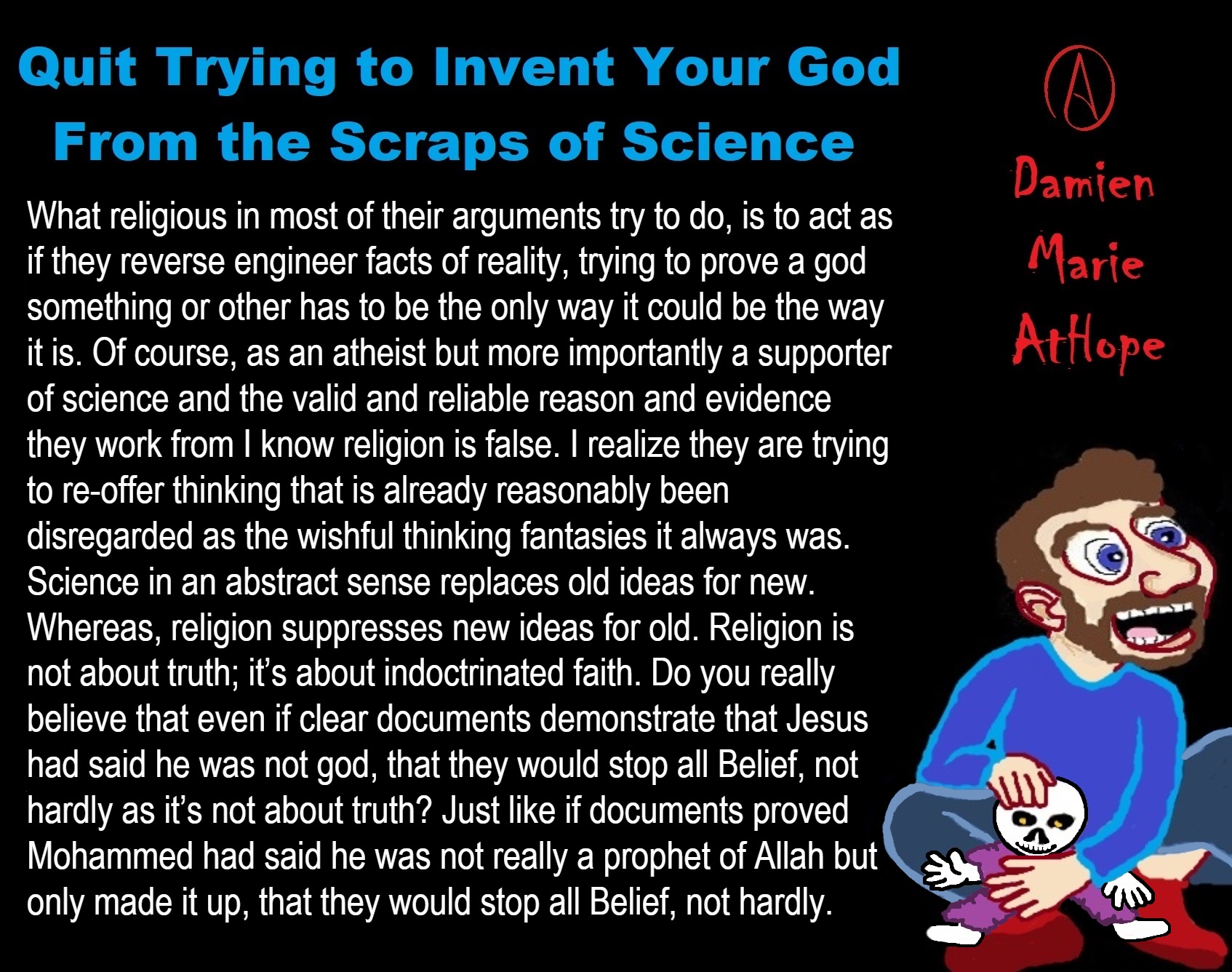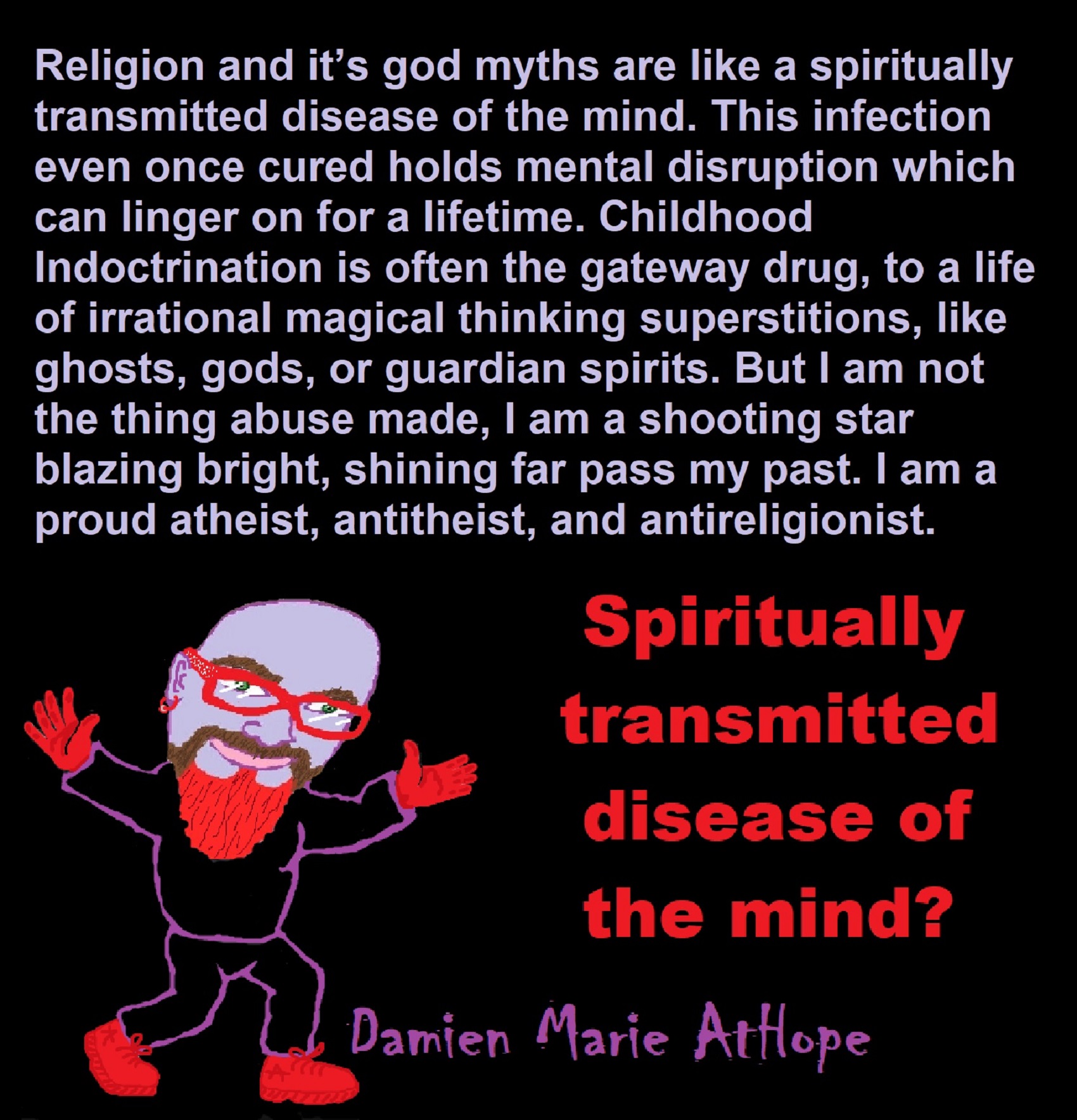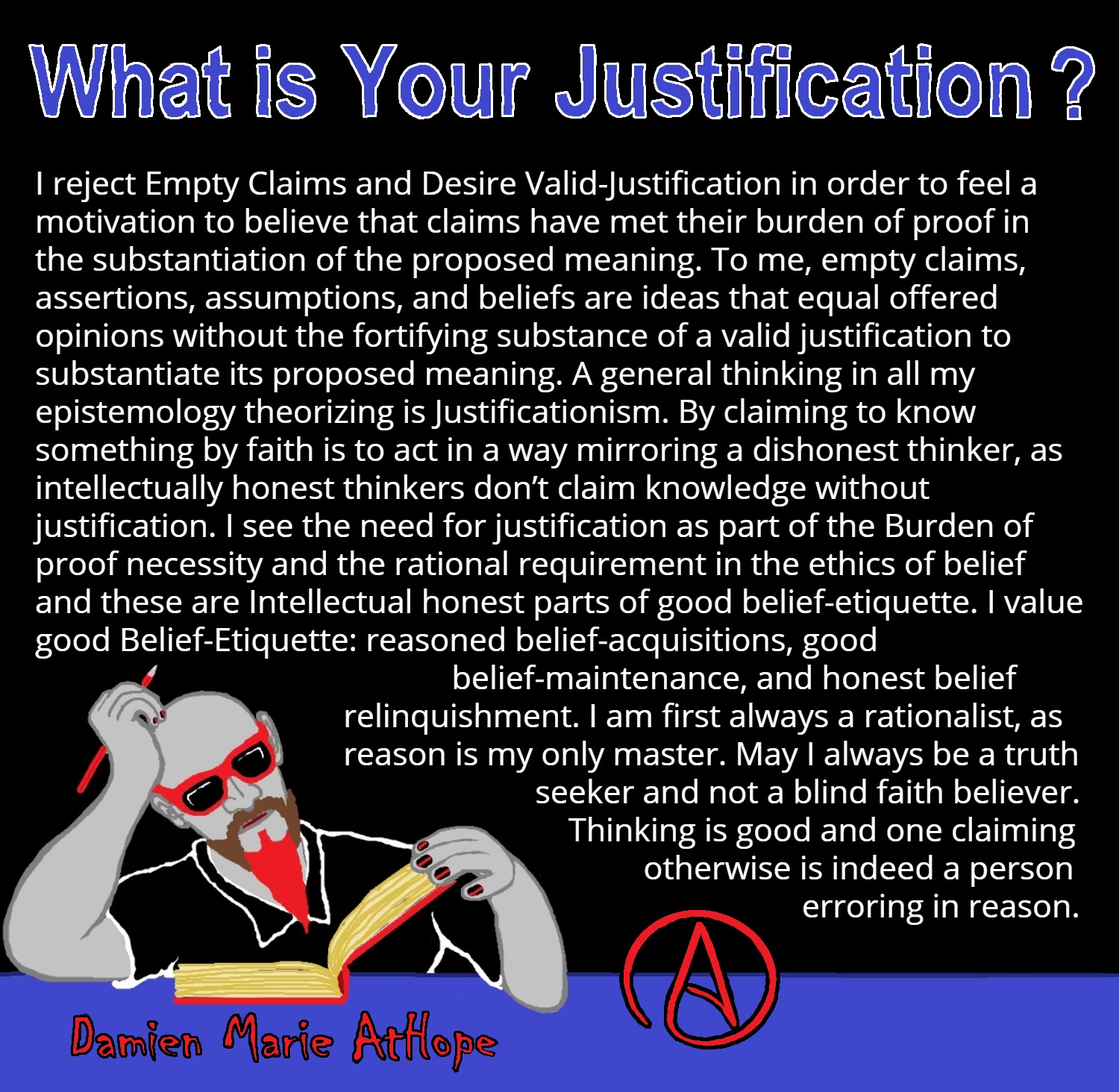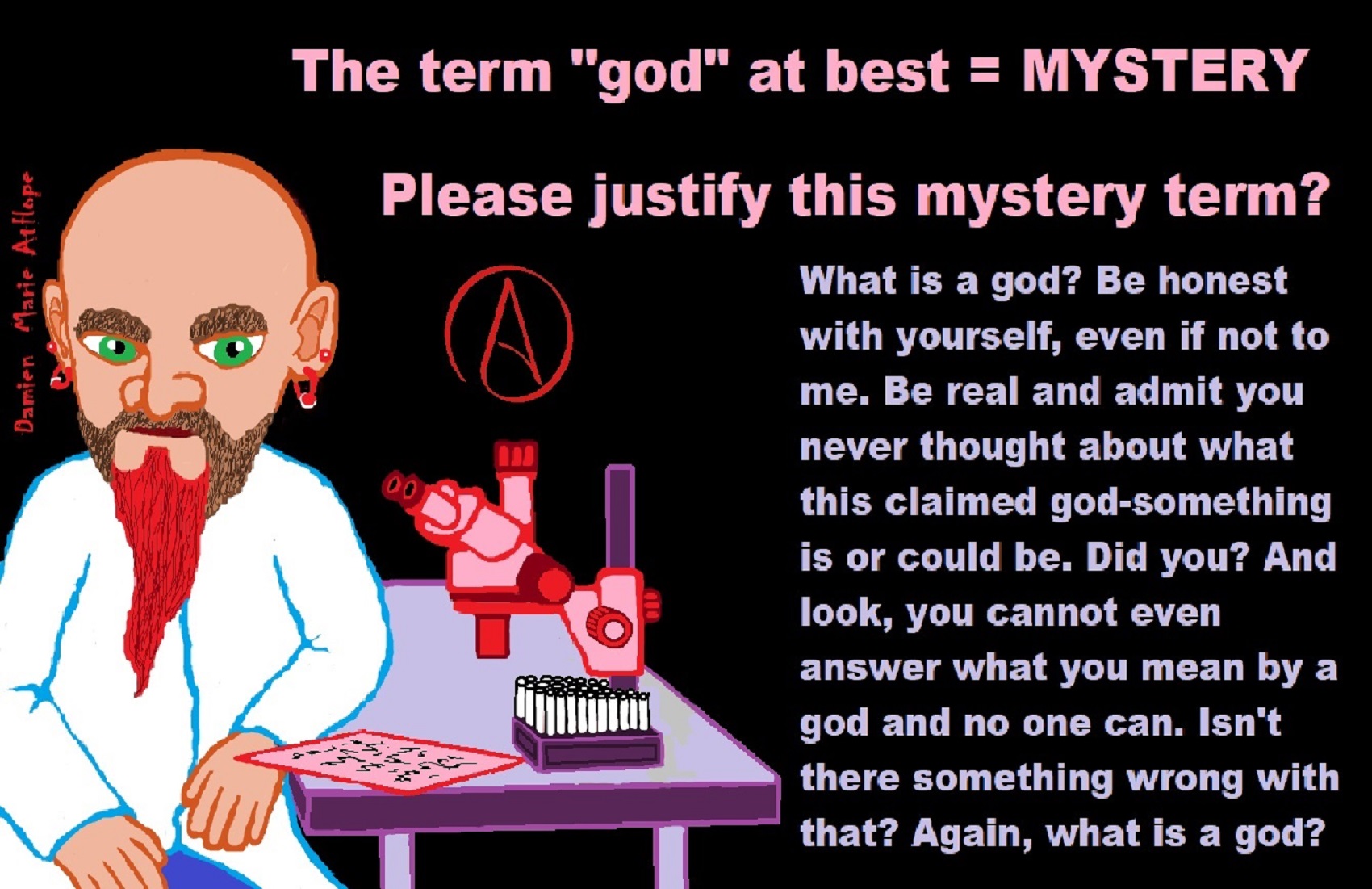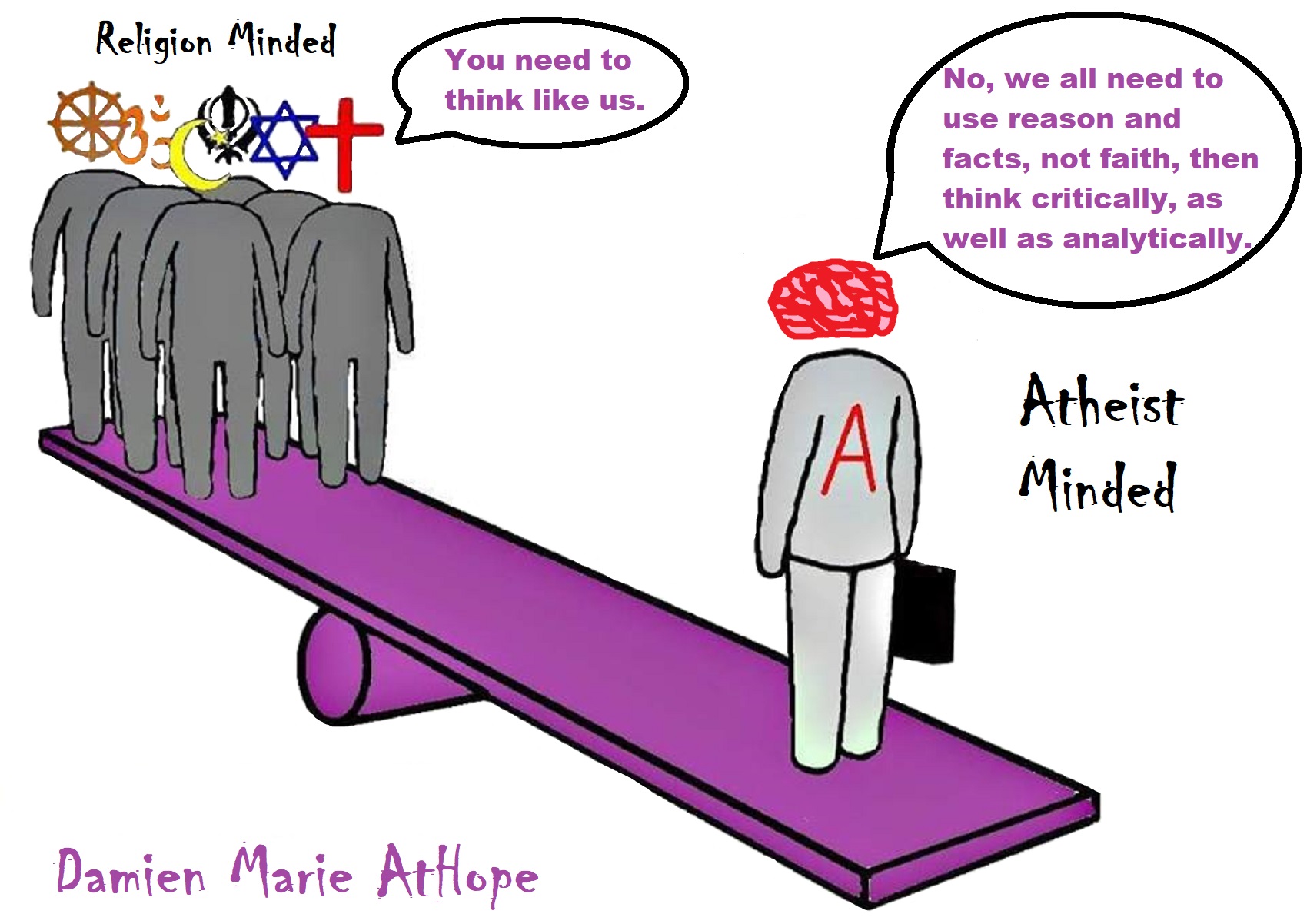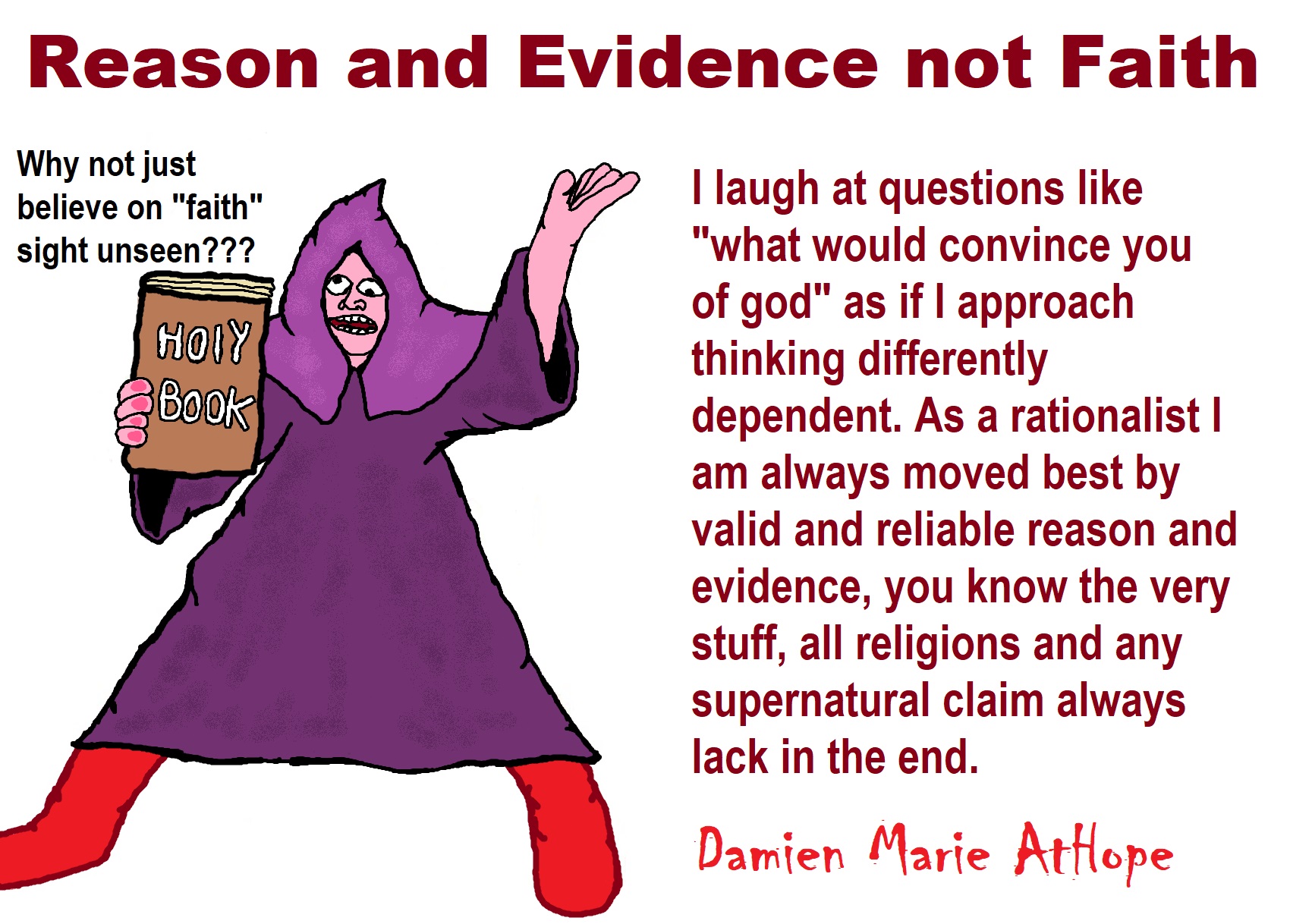
Fideism (faith-ism) is Theistic Reality Confusion
The god claim is a clown car in the magic big top of Fideism!
Dogmatic-Propaganda Must not go Unchallenged
Religionists like to act as if it is they who are being persecuted when it is them forcing what and how they believe on others and asking stupid questions to atheists, such as, I do not understand why you cannot just let religion believers live and let live. I could say, I don’t understand why religious never has, nor ever will just live and let live. However, I already know why, they are Dogmatic-Propaganda that wishes self-replication and oppression of those who don’t fall in line and thus every ethical rational thinker must see this as the enemy to a civil humanity that it is, has been and will continue to be if left unchallenged.
Hate the Dogmatic-Propaganda Not the People
Religion is a joke to rationality, that sadly, too many believe. I hate the Dogmatic-Propaganda that is religion, not the indoctrinated victims who believe it. Of course, that concession is only for the flawed belief. As I do hold people accountable for harmful behaviors and religion as it is today is not a reason for harm, it is a commonly used excuse employed by those who wish to harm.
Dogmatic–Propaganda vs. Disciplined-Rationality
Religionists and fideists promote Dogmatic-Propaganda,
whereas atheists and anti-religionists mostly promote Disciplined-Rationality.
Dogmatic–Propaganda commonly is a standard motivator of flawed or irrational thinking but with over seventy belief biases identified in people, this is hardly limited to just the religious or faith inclined. Let me illustrate what I am saying, to me all theists are believing lies or irrationally in that aspect of their lives relating to god belief. So the fact of any other common intellectual indexers where there may be right reason in beliefs cannot remove the flawed god belief corruption being committed. What I am saying is like this if you kill one person you are a killer. If you believe in one god you are a follower of Dogmatic-Propaganda and can not completely be a follower of Disciplined-Rationality. However, I am not proclaiming all atheists are always rational as irrationally is revolving door many people believer or otherwise seam to stumble through. Its just that god belief does this with intentionally.
Disciplined-Rationality is motivated be principles of correct reasoning with emphasis on valid and reliable methods or theories leading to a range of rational standpoints or conclusions understanding that concepts and beliefs often have consequences thus hold an imperative for truth or at least as close to truth as can be acquired rejecting untruth. Disciplined-Rationality can be seen as an aid in understanding the fundamentals for knowledge, sound evidence, justified true belief and involves things like decision theory and the concern with identifying the value(s), reasonableness, verification, certainties, uncertainties and other relevant issues resulting in the most clear optimal decision/conclusion and/or belief/disbelief. Disciplined-Rationality attempts to understand the justification or lack thereof in propositions and beliefs concerning its self with various epistemic features of belief, truth, and/or knowledge, which include the ideas of justification, warrant, rationality, reliability, validity, and probability.
https://en.wikipedia.org/wiki/Rationalism
https://en.wikipedia.org/wiki/Decision_theory
ps. “Dogmatic–Propaganda” & “Disciplined-Rationality” are concepts/terms I created*
A General Thinking in all My Epistemology Theorizing is Justificationism
Trying to Help Promote Knowledge: Philosophy and Science.
Belief-Etiquette
I value good Belief-Etiquette: reasoned belief-acquisitions, good belief-maintenance, and honest belief relinquishment. I am first always a rationalist, as reason is my only master. May I always be a truth seeker and not a blind faith believer. Thinking is good and one claiming otherwise is indeed a person erroring in reason. Which may I remind you is terrible since the most Base Presupposition in our understanding of everything begins in reason.
“Sound thinking to me, in a general way, is thinking, reasoning, or belief that tends to make foresight a desire to be as accurate as one can with valid and reliable reason and evidence.”
A Sound Thinker: uses disciplined rationality
A Shallow Thinker: undisciplined, situational, sporadic, or limited thinking.
Truth Navigation: Techniques for Discussions or Debates
I do truth navigation, both inquiry questions as well as
strategic facts in a tag team of debate and motivational teaching.
Truth Navigation and the fallacy of Fideism “faith-ism”
Compare ideas not people, attack thinking and not people. In this way, we have a higher chance to promote change because it’s the thinking we can help change if we address the thinking and don’t attack them.
My eclectic set of tools for my style I call “Truth Navigation” (Techniques for Discussions or Debates) which involves:
*REMS: reason (rationalism), evidence (empiricism), and methodological “truth-seeking” skepticism (Methodic doubt) (the basic or general approach)
*The Hammer of Truth: ontology, epistemology, and axiology (methodological use of philosophy)
*Dialectical Rhetoric = truth persuasion: use of facts and reasoning (motivational teaching)
*Utilizing Dignity: strategic dignity attacks or dignity enrichments (only used if confusion happens or resistance is present)
Asking the right questions at the right time with the right info can also change minds, you can’t just use facts all on their own. Denial likes consistency, the pattern of thinking cannot vary from a fixed standard of thinking, or the risk of truth could slip in. Helping people alter skewed thinking is indeed a large task but most definitely a worthy endeavor.
I don’t believe in religion, I believe in people. I don’t respect religion, I respect people. I attack bad thinking and bad behaviors, not people. I do not hate religious people, I hate the religion they are indoctrinated in and I speak out to stop the indifference to the harm religions can cause as well as the ignorance they support. Hell yes, I am against the fraud that is the world religions.
Why not be against the promotion of woo-woo pseudo-truth, when I am very against all pseudo-science, pseudo-history, and pseudo-morality and the harm they can produce. Along with the hate, such as sexism and homophobia are too often seen or the forced indoctrination of children. And this coercive indoctrination of the world religions, with their pseudo-science, pseudo-history, and pseudo-morality mainly furthered by forced Hereditary Religion (family or cultural, religious beliefs forced on children because the parent or caregiver believes that way). This is sadly done, even before a child can be expected to successfully navigate reason; it’s almost as if religious parents believe their “woo-woo pseudo-truth” lies will not be so easily accepted if they wait on a mind that can make its own choice. Because we do see how hard it is for the ones forced into Hereditary Religion.
It seems difficult for them to successfully navigate reason in relation to their woo-woo pseudo-truth, found in a religion they were indoctrinationally taught to prefer, because after being instructed on how to discern pseudo-truth as truth than just wishing that their blind servitude belief in a brand of religious pseudo-truth devoid of justified, valid or reliable reason and evidence. I care because I am a rationalist, as well as an atheist. Thus, this religious set of “woo-woo pseudo-truth” pushed on the simple-minded as truth bothers me greatly. So, here it is as simple as I can make it you first need a good thinking standard to address beliefs one may approach as a possible belief warranted to be believed. I wish to smash that lying pig of religion with the Hammer of Truth: Ontology, Epistemology, and Axiology Questions (a methodological use of philosophy).
Overall, I wish to promote in my self and for others; to value a worthy belief etiquette, one that desires a sound accuracy and correspondence to the truth: Reasoned belief acquisitions, good belief maintenance, and honest belief relinquishment. May we all be authenticly truthful rationalists that put facts over faith. Calling out a liar is not the same as lying.
The most Base Presupposition begins in reason. Reason is needed for logic (logic is realized by the aid of reason enriching its axioms). Logic is needed for axiology/value theory (axiology is realized by the aid of logic). Axiology is needed for epistemology (epistemology is realized by aid of axiology value judge and enrich its value assumptions as valid or not). Epistemology is needed for a good ontology (ontology is realized by the aid of epistemology justified assumptions/realizations/conclusions). Then when one possesses a good ontology (fortified with valid and reliable reason and evidence) they can then say they know the ontology of that thing.
So, I think, right thinking is reason. Right reason is logic. Right logic, can be used for mathematics and from there we can get to science. And, by this methodological approach, we get one of the best ways of knowing the scientific method. Activating experience/event occurs, eliciting our feelings/scenes. Then naive thoughts occur, eliciting emotions as a response. Then it is our emotional intelligence over emotional hijacking, which entrance us but are unavoidable and that it is the navigating this successfully in a methodological way we call critical thinking or as In just call right thinking. So, to me, could be termed “Right” thinking, that is referring to a kind of methodological thinking. Reason is at the base of everything and it builds up from pragmatic approaches. And, to me, there are three main approaches to truth (ontology of truth) from the very subjective (Pragmatic theory of truth), to subjective (Coherence theory of truth), then onto objective (Correspondence theory of truth) but remember that this process as limited as it can be, is the best we have and we build one truth ontop another like blocks to a wall of truth.
Science is quite the opposite of just common sense. To me, common sense in a relative way as it generally relates to the reality of things in the world, will involve “naive realism.” Whereas, most of those who are scientific thinkers, generally hold more to scientific realism or other stances far removed from the limited common sense naive realism. Science is a multidisciplinary methodological quest for truth. Science is understanding what is, while religion is wishing on what is not.
Taking down god assertions in 123
1. What is a goD? (an ontology question)
2. How can one claim to know anything about a god? (an epistemology question)
3. How valid, good or worthy is a claim that one knows anything about a god? (an axiological question)
Below I have added the 13 blogs and the sequence they should be read,
so as I believe are in the best order to fully grasp my “The Hammer of Truth” Process.
Ontology (Greek meaning ontos, “being; that which is”; and logos meaning “discourse, study, ratio, calculation, reason”) Ontology is the philosophical study of the nature of being, becoming, existence, or reality, as well as the basic categories of being and their relations.
Epistemology (Greek episteme, meaning “knowledge, understanding”, and logos, meaning “discourse, study, ratio, calculation, reason”) it is the theory of knowledge, especially with regard to its methods, validity, and scope. Epistemology is the investigation of what distinguishes justified belief from opinion.
Axiology (Greek meaning axia, “value, worth”; and logos meaning “discourse, study, ratio, calculation, reason”) it is the philosophical study of value as well as ethics and aesthetics. Formal Axiology is a specific branch of the science of Axiology. Axiology also studies of goodness, value or worth, in the widest sense of these terms. Its significance lies in the unification that it has provided for the study of a variety of questions—economic, moral, aesthetic, and even logical—that had often been considered in relative isolation.
- “Hammer of Truth” response to “Do you Believe in god?”
- “The Hammer of Truth” (scientific philosophy: Ontology, Epistemology, & Axiology) in action.
- Error Crushing Force of the Dialectic Questions and the Hammer of Truth
- I use a kind of Dialectical Rhetoric = truth persuasion (motivational teaching)
“The Hammer of Truth: Ontology, Epistemology and Axiology”
Mock Debate court using the “Hammer of Truth”
- Ontology “Reality” questions/assertion: Witness gives evidence about the claim.
- Epistemology “Truth” questions/assertion: Lawyer searches for warrant or justification for the claim.
- Axiology “Goodness-for” questions/assertion: Judge/Jury assesses and value judges because of qualities in or lacking in the claim.
Always try to follow this attack order:
*Ontology, (understanding the thingness of things; like what is or can be real, like not god)
-What is your claim?
-What aspects must be there for your claim?
-What makes your claim different than other similar claims?
*Epistemology, (understanding what you know or can know; as in you do have and thing in this reality to know anything about this term you call god, and no way of knowing if there is anything non-naturalism beyond this universe and no way to state any about it if there where)
-How do know your claim?
-How reliable or valid must aspects be for your claim?
-How does the source of your claim make it different than other similar claims?
*Axiology, (understanding what is good or valuable as well as what is evil or unvaluable like how the stories about theist theistic gods are often racist, sexist, homophobic, transphobic intersexphobic, xenophobic, etc. Thus, they are directly against humanity and thus are evil and unvaluable. Unvaluable; as in the god concept you have is evil and demonstrably harmful and thus is highly unvaluable to humanity)
-Why are your objects of proposed value subjective psychological states or objective physiological external world states for your claim?
-Why do your purposed descriptive words fit qualities for valuation (such as “powerful”, “knowing”, and “present” in the Omnipotent: all-powerful, Omniscient: all-knowing, and Omnipresent: all-present god assertion) your claim?
-Why is your value-for, worth-for, and/or goodness-for claims different than other similar claims?
Take for instance how Religion supporters try the evaluation tactic of saying “there are peaceful Religions.”
I may respond, what do you mean by Religion and what do you mean by painful or good” (asking to find the truth or as usual expose the lack of a good Ontology)
Then, I may respond, “how do you know that what is your sources and how reliable they are” (asking to find the truth or as usual expose the lack of a good Epistemology)
Then, I may respond, “what value do you think what you are saying has and to what level of proof do you feel truth needs as well as how do you ensure Accuracy” (asking to find the truth or as usual expose the lack of a good Axiology)
Let’s look at the “gOD claim” with the Hammer of Truth
To me god is a the Presuppositional Error it assumes unsupported oncology assumptions. First, truly what is a god and how can you claim to know about it? Guessing is not evidence, neither is wild, unfounded assertions that are written in reality devoid documents such as holy books. Atheists do not have to prove that gods do not exist, as gods have never been proven to exist. Nor is there any good reason to think they could exist! In the branch of linguistics known as pragmatics, a presupposition is an implicit assumption about the world or background belief relating to an utterance whose truth is taken for granted in discourse.
Let me explain why as an axiological atheist (value theory atheist) even the belief in the concept of god is ethically vile to me. God belief is inherently immoral to me it is the belief that supports an all-powerful being who willfully allows suffering, something that no ethical person would tolerate if they had the ability to do otherwise. Moreover, a common attribute of god belief is support of this claimed greater being of high intelligence and self will forcing its will and standards on other beings of high intelligence and self-will. This force is unethical and abusive to the rights of humanity. Furthermore, many who subscribe to this force abusive relationship god claim an even more revolting ethical atrocity called hell where eternal horror and suffering is dished out by direct will of the claimed stronger immoral god being against the defenseless undeserving subjugated humanity. Thus, being one, who values rights and ethics, it sickens me to even speak of such willful misconduct of justice. Your god concept is vile… (axiology value judgment).
The god claim is like a clown car rolling in from out of nowhere and it seems like it is only one or possibly a few bad ideas, but no. No, it is a dark festival that masquerades as truth but it is only an evil funhouse of mirrors that distorts reality. The term god is an empty meaningless term and if it was not for man-made myths or wild speculations which are usually the misinterpretations of nature, no one would claim to know what a god is or could be. Unless one falls back to the circus of fallacies in the magic big top of fideism and the faith fallacy that you do not need anything but faith to validate, justify, or prove any mystical belief you so desire.
The God Fallacy is that there is no epistemically warranted or justifiably reliable evidence for god(s) existence; most ideas offered are stretches of unreason promoting seemingly implausible knowledge or reality claims. Moreover, beyond this is the self-evident realization that there is no reliable and /or verifiable evidence that could be used to define what god term actually is or could be assured to involve. Because it is never good to just randomly conceptualize or fabricate from bias trying to force connections into existence. epistemically warranted or justifiably reliable evidence or even a preset of proofs that do not hold gaps a believer want to fill with an arbitrary beliefs things need a god explanation and yet again what does god even mean. One his furthered nothing with god talk until they offer clear links to understand what could rightly make up the empty term g. o. d. (Group Originated Delusion).
Any reasonable thinker should conclude that clear links to any knowledge are required to comprehend what to ask, where to look, or what to state is involved. This would seem especially important since what is on the line is the actual truth or falsehood of the great believed “IT” of somethingism. Do you wish to just assemble or make up your god thinking as you go, greedily forcing anything that seems slow enough to not get away or is the actual truth in reality you seek even if godless as finding the true is the main pursuit, as your aim is what true right, taken with the deepest integrity? One should desire such intellectual rigor in order to even distinguish if we need to inquire or have a way to question a possibility of existence, as this empty termed “it” god of nothingism is unknown in every way even in its “it” status outside of faith superstitions, Dogmatic–Propaganda, delusion, myths and lies.
Religion is just Dogmatic–Propaganda, such as how it is wrong to start with full belief built only upon faith: then search and anything unknown, claiming it somehow justifies or is evidence for their specific God Fallacy.
Another attribute of the God Fallacy is that believers seem to insinuate, if they can in anyway demonstrate (even the possibility of a thing that could seem to be a something attributed to a god) then they have proved that the god they believe in is true. And yet is it not true that man will always fail to prove a specific god? Religion is big on claims but small on reasoning. Take the Abrahamic faiths; they propose a very specific, well-defined god, but in reality, they advocate a very unspecified god; a naturalistic, inferred-theistic-creationism or the god of intelligent design. In other words, when pressed to demonstrate god in the world, or as the reason for the big bang, they can at best only try to surmise a magical power or unknown and unknowable possible something as the “creator.” But the question needs to asked, how does that prove any specific god? So even if we were to concede, for the sake of argument, that some god, phantom-menace started things, they still have to show that this god is the very same as the god in which they believe.
The truth is, for all the appeals they make to nature in order to justify their god, not one appeal is valid in any way to confirm that their god (and only their god) is true, they must always leave the facts and return to faith. Thus, these haughty theists always fail to show any naturalistic reasons for believing in their special-needs god. What they show instead is a belief, not in the god of some myth or scriptures, but belief in a projected somethingism-god attributed to nature, which is indistinguishable from a nothingism, godless reality attributed by nature. However, the issues don’t stop there, as they also would have to prove, or give warrant, as well as justification for every attribute and claimed character trait attached to their specific god using only natural arguments, not some Holy Book or otherworldly revelation.
A Coherent Definition of god?
I am an Ignostic atheist and not only do not believe in the term gods I reject that even the term or concept of god has any real thing or true reality connected definition. To me there is no one coherent definition of god even if they think articulation proves real meaning, this proves little more than me saying someone believes in a “Triangle-Square-Circle”. To the term god I thus regard it as empty of real meaning and or real definition constancy, so I see it as something that is not really known or knowable or coherently define-able as a real object even if it can add arbitrary words to articulate it is still not something outside man-made arbitration.
One may say no the god definition is real one cannot say it is not, as most people generally know what the term god means thus that cannot be rejected. Really?? I could be misunderstanding this reasoning put against Ignostic Atheist thinking but to me it seems to hold the opinion, saying I must accept the god concept as something definable in reality because of ad populum? In argumentation theory, an argumentum ad populum (Latin for “appeal to the people”) is a fallacious argument that concludes that a proposition is true because many or most people believe it: “If many believe so, it is so.”
Bigfoot’s, Unicorns, and Gods the rational conclusion using Axiology
So how do we form rational conclusions? More importantly, how do we differentiate between the levels involved to establish a conclusions rational viability.
It takes axiology or the value judgment the worthiness or lack thereof in relation to the available reason and evidence. So let’s start with the axiological viability of Bigfoots:
There is no available evidence for Bigfoots.
But is their proposition outside of reason?
Always start in reality from the evidence we do know, such as a primate/nonhuman hominid close to that of both humans and other nonhuman primates is not entirely outside all possibility of reason even though lacking all evidence. Therefore, belief is not warranted and the axiological worthiness of possibility is low enough to motivate disbelief.
Next the Axiological viability of Unicorns (ie. a horse with a single horn on its head):
There is no evidence for Unicorns.
But is their proposition outside of reason?
As always start in reality from the evidence we do know, such as by looking at the evolution of the horse not once was there a horn on any of the several stages of animals to the horse we know today. So it is relatively outside of possibility though as it is still only claiming non-fantastic attributes it is only somewhat ridiculous. Therefore, belief is not in any way warranted and the axiological worthiness is so low to highly support disbelief.
And, now the Axiological validity of Gods:
There is no evidence for Gods.
But is their proposition outside of reason?
As always start in reality from the evidence we do know, such as never in the history of scientific research or investigation has any supernatural claims shown to be true. So it is completely outside of possibility and is utterly ridiculous. Therefore, belief should be rejected as there are no warrants at all and it is axiologically unworthy to such a preponderance to demand disbelief.
The following are some evidence against a caring god working in the world. A recent study of the current living conditions throughout Africa shows that more than one billion people do not have enough clean water to provide for their basic human needs. As a result, more than 2,500 children are dying each day. I guess it is that god gives us free will by keeping children from clean water in an unproportioned amount to the civilized science filled world. I ask you, does your god not hear their prayers? According to Missionaries of Africa (2008), there is a water crisis and diseases that are living in dirty water are wiping out entire villages and communities. Does god exist? Does the magic chanting of prayer seem to work? Suppose for a minute with the understanding of religious believe, if there was a loving god and it answered even some prayers, would not the most deserving be the non-sinning? Moreover, what living human could be said to be less sinning than a baby and thus the most deserving. In addition, babies or children are likely the ones religionists/fideists pray most often, for when they are in trouble. Belief changes nothing. Whatever circumstances you are in or not, has nothing to do with belief. If you are poor, belief does not make you not poor. If you are rich, you do not stay rich because of belief. You would think that poor people would have the benefit of the heavenly means and have god on their side, if anyone would, right? Overall, in 186 countries, first-day child death rates for babies are 6.9%. Where was god? In Angola, 8% of the babies die and 95% of the population is christian. In Congo, 7.5% of the babies die and 95.8 % of the population is christian. Whereas in Guinea-Bissau, 9% of the babies die and 10 % of the population is christian and in Niger 8.7% of the babies die and 5% of the population is christian. Therefore, being a christian and begging for an all-powerful all-loving god myth to do something that any half-decent human being would hardly even need to be asked to help an innocent child, shows that belief seems to make no difference in the world because the world is godless and sadly babies die. Isaiah 45:7 “I form the light, and create darkness: I make peace, and create evil: I god do all these things.” Ref
Just think, the bible god “could” have banned slavery or shellfish and he chose to ban shellfish (Leviticus 11:12) and actually support slavery (Leviticus 25:44-46) even in the new testament (Ephesians 6:5; 1 Timothy 6:1-2) and Jesus clearly approves of beating slaves even if they didn’t know they were doing anything wrong (Luke 12:47-48) how crazy and immoral is that for a man-made fairy tales. I will openly say faith is foolish lacking credibility and it is stupid to hold on to beliefs that are disproved by science fact. However, I don’t usually call people names even ones saying things I believe are ridiculous nor do I belittle them instead I strive to and support attacking the thinking and not the person.
What is a god? Just a Empty Label.
Doubt god(s)? No, I stopped believing Fairytales.
Here are some more of my blogs that relate:
- My “Methodological Rationalism” approach
- Grasping the status of truth (ontology of truth)
- The Ontology of Humanistic Economics in Society?
- Why care? Because we are Dignity Beings.
- Psychological certainty and Epistemic certainty?
Yes, I am certain there is not any validity to the god term, thus no god.
- I Believe Archaeology, not Myths & Why Not, as the Religious Myths Already Violate Reason!
- Archaeological, Scientific, & Philosophic evidence shows the god myth is man-made nonsense.
“I will respect your beliefs Damien after you respect mine.” – Challenger
My response, Well I don’t care if you respect or don’t respect my beliefs as your approval is not needed to validate reality.
god Claims are a Non-Reality Commodity
If you think you believe in a god, “what do you mean by god,” saying a name tells me not one thing about the thing I am asking to know “its” beingness/thingness/attributes/qualities. Thus, what is the thing “god” to which you are talking about and I want you to explain its beingness/thingness/attributes/qualities? Religious/theistic people with supernatural beliefs often seem as though they haven’t thought much about and that is something we can help using ontology questions about the beingness/thingness/attributes/qualities they are trying to refer too. What do you mean by god, when you use the term god? And, I am not asking you for the name you attach to the thing you label as a god. I don’t need to know what the god you believe is known “by.” I am asking, what is the thing you are naming as a god and what that thing is, its qualities every detail like all things have if they are real. Are you just making stuff up or guessing/hoping or just promoting unjustified ideas you want to believe, what is a god?
Do you want what is true or want what you believe without concern for what may actually be true?
Certainty like knowledge is an epistemic property of belief.
Once one has a valid and reliable belief formed on true reason and evidence then one has knowledge. When such knowledge is held with a high warrant it can provide certainty. There is not only one kind of certainty and most wrongly confuse certainty with incorrigibility or incorrectibility.
One kind of certainty is psychological certainty:
A belief is psychologically certain when the subject who has it is supremely convinced of its truth. Certainty in this sense is similar to incorrigibility, which is the property a belief has of being such that the subject is incapable of giving it up.
But psychological certainty is not the same thing as incorrigibility. A belief can be certain in this sense without being incorrigible; this may happen, for example, when the subject receives a very compelling bit of counterevidence to the (previously) certain belief and gives it up for that reason.
Another kind of certainty is epistemic certainty:
A belief is epistemically certain when it has the highest possible epistemic status. Epistemic certainty is often accompanied by psychological certainty, but it need not be. It is possible that a subject may have a belief that enjoys the highest possible epistemic status and yet be unaware that it does. In such a case, the subject may feel less than the full confidence that her epistemic position warrants.
I am psychological certain the is no gods because of epistemic certainty of Scientific Realism and Methodological Naturalism demonstrating no supernatural magic of any kid exists and never has. http://plato.stanford.edu/entries/certainty/
- Certainty and Probability
- Philosophical Skepticism, Solipsism and the Denial of Reality or Certainty
- Trying to Help Promote Knowledge: Philosophy and Science.
What makes a belief an epistemically justified belief?
Probability, best explanation, logical consistency, natural
consistency, reliability, and the broadest possible view of plausibility, are some of the standards that must be met. http://philosophyideas.com/…/papers/Justified%20belief.pdf
Truth is a Value (axiological) Judgment.
A fact is a statement that is consistent with reality or can be proven with evidence. The word “fact” derives from the Latin factum, and was first used in English with the same meaning: a thing done or performed, a meaning now obsolete. The common usage of “something that has really occurred or is the case” dates from the middle of the sixteenth century. Fact is sometimes used synonymously with truth, as distinct from opinions, falsehoods, or matters of taste. https://en.wikipedia.org/wiki/Fact
- Religion vs. Science, Don’t Confuse Beliefs
- Understanding Religion Evolution
- No Magic Zone: including politics and religion
- Truth Navigation and the fallacy of Fideism “faith-ism”
- Truth Navigation: Techniques for Discussions or Debates
- Grasping the status of truth (ontology of truth): pre-logic, logic, and post-logic?
“The Bold Writing below are “blog” links click on them to read that blog, the writing below then is just a short bit of the information you will find inside.”
1. Ontology, Epistemology, & Axiology argument/challenge protocol
by Damien AtHope | Oct 13, 2016 | Blog
Ontology (Greek meaning ontos, “being; that which is”; and logos meaning “discourse, study, ratio, calculation, reason”) Ontology is the philosophical study of the nature of being, becoming, existence, or reality, as well as the basic categories of being and their relations. Epistemology (Greek episteme, meaning “knowledge, understanding”, and logos, meaning “discourse, study, ratio, calculation, reason”) it is the theory of knowledge, especially with regard to its methods, validity, and scope. Epistemology is the investigation of what distinguishes justified belief from opinion. Axiology (Greek meaning axia, “value, worth”; and logos meaning “discourse, study, ratio, calculation, reason”) it is the philosophical study of value as well as ethics and aesthetics. Formal Axiology is a specific branch of the science of Axiology. Axiology also studies of goodness, value or worth, in the widest sense of these terms. Its significance lies in the unification that it has provided for the study of a variety of questions—economic, moral, aesthetic, and even logical—that had often been considered in relative isolation. “The Hammer of Truth” is the use of Ontology, Epistemology and Axiology questions to remove errors and add accuracy. It is also my folk name for Scientific Philosophy: Ontology, Epistemology, and Axiology” Ontology, Epistemology, & Axiology OEA (The Hammer of Truth) OEA “Hammer of Truth” Questions: Ontology, Epistemology, & Axiology questioning tools in inquiry, disagreements, arguments, or debates. *Ontology (thingness of things) questions to define or compare and contrast thingness. *Epistemology (knowledge of things) questions to explode or establish and confirm knowledge. *Axiology (value/worth/goodness of things) questions to valueize (value judge) or establish and confirm value or disvalue, worth or dis-worth, as well as goodness…
2. Grasping the status of truth (ontology of truth)
by Damien AtHope | Sep 18, 2016 | Short-writing or Quotes
I hold in general Truth is a value judgment we place on what we think is evidence. There are three main approaches to truth (ontology of truth) from the very subjective, subjective, or to the objective. *Pragmatic theory of truth: very subjective “our ideas are true is they work to solve problems, are useful” A common feature is a reliance on the pragmatic maxim as a means of clarifying the meanings of difficult concepts such as truth; and an emphasis on the fact that belief, certainty, knowledge, or truth is the result of an inquiry. The pragmatic maxim is a normative recommendation or a regulative principle in the normative science of logic, its function is to guide the conduct of thought toward the achievement of its purpose, advising on an optimal way of “attaining clearness of apprehension”. https://en.wikipedia.org/wiki/Pragmatic_theory_of_truthhttps://en.wikipedia.org/wiki/Pragmatic_maxim *Coherence theory of truth: subjective “our ideas are true if they are internally consistent not contradictory” A common thinking is to regard truth as coherence within some specified set of sentences, propositions or beliefs. There is no single set of such “logical universes”, but rather an assortment of perspectives that are commonly discussed under this title. A positive tenet is the idea that truth is a property of whole systems of propositions and can be ascribed to individual propositions only derivatively according to their coherence with the whole. While modern coherence theorists hold that there are many possible systems to which the determination of truth may be based upon coherence, others, particularly those with strong religious beliefs hold that the such truth only applies to a…
3. Challenged or Challenging? (questions of ontology)
by Damien AtHope | Dec 3, 2016 | Blog
Challenged or Challenging? All thinkers should know that ontological (thingness) definition require answers and that need to answers in can we confirm or conclude what a god even is could be to as well as if god exists, what is a god, and how or where/how did you acquire such definitions; impossible or possible for a god to exist. “From a confirmed or concluded” you have or do not have well definite if a god to the reality of a god. When anyone talks of challenges they are generally in some way even if only a unstated presupposition will include or involve three things: 1. the ontology (the thingness of things), 2. the epistemology ( how you know what you think you believe or know) and 3. the axiology (what and why of value/worth/good)? The ontology is of core importance to require it by asking for ontological definition or definition. This would make a good first act of fighting without having to fight, by always try starting by making them define the details of any claims but it can be done just as easily for attacks as well. Ontology attacks: slow down and unpack any claims, “you said you know god is real.” What do you mean by the qualities, attribution, or thingness of the things involved in the term god or what do you know about the term god and is an estimate for the faith reality you agree to believe in. Ontology defense: slow down and unpack any attacks, “you said I can’t be moral or good without god.” What do you mean by the qualities, attribution, or…
4. Let to tell you about ontology as I see it and use it.
by Damien AtHope | Jun 12, 2017 | Blog
Let to tell you about ontology as I see it and use it. Ontology (Greek meaning ontos, “being; that which is”; and logos meaning “discourse, study, ratio, calculation, reason”) Ontology is the philosophical study of the nature of being, becoming, existence, or reality, as well as the basic categories of being and their relations. *Ontology (thingness of things) questions to define or compare and contrast thingness. Ontology “Reality” questions/assertion: Witness gives evidence about the claim. Ontology, (understanding the thingness of things; like what is or can be real, like not god) -What is your claim? -What aspects must be there for your claim? -What makes your claim different than other similar claims? Take for instance how Religion supporters try the evaluation tactic of saying “there are peaceful Religions.” I may respond, what do you mean by Religion and what do you mean by painful or good” (asking to find the truth or as usual expose the lack of a good Ontology) To me belief ontologies address the conceptual schemas involved, at the intersection of three elements: A belief is a placeholder for a mental agreement to a offered idea, behavior or thing. We dont know what us being accurately believed and this mans all beliefs are open to challenge or they should be. Manky people either have no standard to how they test or process their thinking and thus have untrustworthy and such a lack of a developed thought structure employ thinking systems with a high susceptibility to flaws, And this is where we use ontological…
5. “The Hammer of Truth” (scientific philosophy: Ontology, Epistemology, & Axiology) in action.
by Damien AtHope | Jan 13, 2017 | Blog
Ontology, Epistemology, & Axiology argument/challenge protocol Ontology (Greek meaning ontos, “being; that which is”; and logos meaning “discourse, study, ratio, calculation, reason”) Ontology is the philosophical study of the nature of being, becoming, existence, or reality, as well as the basic categories of being and their relations. Epistemology (Greek episteme, meaning “knowledge, understanding”, and logos, meaning “discourse, study, ratio, calculation, reason”) it is the theory of knowledge, especially with regard to its methods, validity, and scope. Epistemology is the investigation of what distinguishes justified belief from opinion. Axiology (Greek meaning axia, “value, worth”; and logos meaning “discourse, study, ratio, calculation, reason”) it is the philosophical study of value as well as ethics and aesthetics. Formal Axiology is a specific branch of the science of Axiology. Axiology also studies of goodness, value or worth, in the widest sense of these terms. Its significance lies in the unification that it has provided for the study of a variety of questions—economic, moral, aesthetic, and even logical—that had often been considered in relative isolation. “The Hammer of Truth” is the use of Ontology, Epistemology and Axiology questions to remove errors and add accuracy. It is also my folk name for Scientific Philosophy: Ontology, Epistemology, and Axiology” I received this message: “Hey Damien, how are things? I came across your video “Atheist in a Wheelchair challenges a street preacher.” and was wondering to see if you’re willing to make a video of questions for Christians (preferably myself) and I make a response video discussing and answering those questions you have for believers of God. (Christ) I am a Christian and would like to share…
6. Basics of my Methodological Rationalism Epistemology Approach
by Damien AtHope | Mar 16, 2017 | Blog
Basics of my Methodological Rationalism Epistemology Approach The Disproof Atheism Society: EMPIRICAL, CONCEPTUAL, and DISPROOFS of gOD Epistemology: the theory of knowledge, especially with regard to its methods, validity, and scope. Epistemology is the investigation of what distinguishes justified belief from opinion. Ref I generally follow the standard in philosophy JTB: Justified True Beliefs. 1. Knowledge as Justified True Belief 1.1 The Truth Condition 1.2 The Belief Condition 1.3 The Justification Condition Justified / True / Beliefs Justified? To established justification I use the philosophy called Reliabilism. “Reliabilism is a general approach to epistemology that emphasizes the truth-conduciveness of a belief-forming process, method, or other epistemologically relevant factor. The reliability theme appears both in theories of knowledge and theories of justification.” Ref True? For the true part I use the philosophy called The Correspondence Theory of Truth. “The correspondence theory of truth states that the truth or falsity of a statement is determined only by how it relates to the world and whether it accurately describes (i.e., corresponds with) that world.” Ref Beliefs? For the beliefs part I use what philosophy calls The Ethics of Belief. “The “ethics of belief” refers the intersection of epistemology, philosophy of mind, psychology, and ethics. The central is norms governing our habits of belief-formation, belief-maintenance, and belief-relinquishment. It morally wrong (or epistemically irrational, or imprudent) to hold a belief on insufficient evidence. It morally right (or epistemically rational, or prudent) to believe on the basis of sufficient evidence, or to withhold belief in the perceived absence of evidence. It always obligatory to seek out…
7. The Gettier Problem Helps MY Epistemology style
by Damien AtHope | Dec 16, 2016 | Blog
“You also seem to be ignoring those elusive things called Gettier problems, Damien.” Why do people believe that, they have proof that one must not ever use JTB? “Gettier problems” or cases are named in honor of the American philosopher Edmund Gettier, who discovered them in 1963. They function as challenges to the philosophical tradition of defining knowledge of a proposition as Justified True Belief “JTB” in that proposition. Ref My response, you mean that sometimes there may be a requirement to add further delineation to one’s JTB understanding of what constitutes knowledge. Yes, it’s not a problem it showed we must do more than hasty generalizations for our epistemological methodology, not a problem for me at all as a methodological rationalist. it only validates my thinking with the others around me once they get what I am doing with my conception of knowledge Justified True Beliefs? I follow the standard in philosophy JTB Justified True Beliefs. “Theory of justification is a part of epistemology that attempts to understand the justification of propositions and beliefs. Epistemologists are concerned with various epistemic features of belief, which include the ideas of justification, warrant, rationality, and probability. Of these four terms, the term that has been most widely used and discussed by the early 21st century is “warrant”. Loosely speaking, justification is the reason that someone (properly) holds a belief. When a claim is in doubt, justification can be used to support the claim and reduce or remove the doubt. Justification can use empiricism (the evidence of the senses), authoritative testimony (the appeal to criteria and authority), or logical deduction.” Ref Justified /…
8. Pragmatic theory of truth, Coherence theory of truth, and Correspondence theory of truth
by Damien AtHope | Jun 20, 2017 | Blog
Pragmatic theory of truth, Coherence theory of truth, and Correspondence theory of truth To me, there are three main approaches to truth (ontology of truth) from the very subjective (Pragmatic theory of truth), subjective (Coherence theory of truth), or to the objective (Correspondence theory of truth). *Pragmatic theory of truth: very subjective “our ideas are true if they work to solve problems, are useful” A common feature is a reliance on the pragmatic maxim as a means of clarifying the meanings of difficult concepts such as truth; and an emphasis on the fact that belief, certainty, knowledge, or truth is the result of an inquiry. The pragmatic maxim is a normative recommendation or a regulative principle in the normative science of logic, its function is to guide the conduct of thought toward the achievement of its purpose, advising on an optimal way of “attaining clearness of apprehension”. Ref Ref *Coherence theory of truth: subjective/objective “our ideas are true if they are internally consistent not contradictory” A common thinking is to regard truth as coherence within some specified set of sentences, propositions or beliefs. There is no single set of such “logical universes”, but rather an assortment of perspectives that are commonly discussed under this title. A positive tenet is the idea that truth is a property of whole systems of propositions and can be ascribed to individual propositions only derivatively according to their coherence with the whole. While modern coherence theorists hold that there are many possible systems to which the determination of truth may be based upon coherence, others, particularly those with strong religious beliefs hold…
9. Axiology and Value Consciousness
by Damien AtHope | Jan 19, 2017 | Blog
We need to make everyone understand the nature of values (axiology). So, one could ask what is axiology? Axiology (Greek meaning axia, “value, worth”; and logos meaning “discourse, study, ratio, calculation, reason”) it is the philosophical study of value as well as ethics and aesthetics. Formal Axiology is a specific branch of the science of Axiology. Axiology also studies of goodness, value or worth, in the widest sense of these terms. Its significance lies in the unification that it has provided for the study of a variety of questions—economic, moral, aesthetic, and even logical—that had often been considered in relative isolation. Yes, axiology, the very impartation of value consciousness is what is required. So, one could ask what is Value Consciousness? Value consciousness / Value awareness or Aware Value Critiques / Valid Value Judgments. Value-blindness Gives Rise to Sociopathic evil. Axiological Dignity Being Theory There can be several different ways to view “Value Consciousness” such as following specific thinking tools people use and assessing them reliably: some limited thinking tools we employ are desire, interest, taste, feeling, faith, etc. The characteristics of these or such tools must not conflate there truth acquisition or truth conformation ability or potential. First assessing them with a “Value Consciousness” exposes that they have obvious limitations or even inability to see or adequately judge objective truth worthy to be called knowledge. Instead “they” (desire, interest, taste, feeling, faith, etc) at best can only project a situational subjective half-truth and are in stark contrast to valid distinctions rightly following forms of Value consciousness / Value awareness or Aware Value Critiques / Valid Value…
10. Axiology, Naturalism, Realism and Moral Theory Ideas
by Damien AtHope | Oct 10, 2015 | Blog
I am a Realist in Many ways, I have a positive epistemic attitude (belief) towards or in philosophical realism that there is a real external world and that is can be know or substantially approximated by humans objectively. I have a positive epistemic attitude towards or in scientific realism that the content of the best scientific theories, models, and aspects of the world described by the sciences can be know or substantially approximated by humans objectively. I have a positive epistemic attitude towards or in logical realism such as that logic is the means of discovering the structure of facts and its projection in the language such as the Law of Non-Contradiction or logical fallacies which represent logical truths pertaining to aspects of the world and can be know or substantially approximated by humans objectively. I have a positive epistemic attitude towards or in mathematical realism such as that 2 + 2 equals 4 even if there are no intelligences or minds. Because math is in a sense a method of communication or description of and or about aspects of the world quantifying what can be know or substantially approximated by humans objectively. I have a positive epistemic attitude towards or in value realism roughly speaking “axiological realism,” is that value claims (such as, nurturing a baby is good and abusing a baby is bad) can be literally true or false; that some such claims are indeed true; that their truth can be know or substantially approximated by humans objectively. I have a positive epistemic attitude towards or in epistemological realism roughly speaking, is that what you know about…
11. Applying Axiological Thinking
by Damien AtHope | May 7, 2017 | Blog
Applying Axiological Thinking: Dr. Hartman identified three dimensions of reality, which he called the Dimensions of Value. We value everything in one of these three ways or in a combination of these dimensions. The Dimensions of Value are systemic, extrinsic, and intrinsic. Ref People: Intrinsic Mostly Intuitive thinking Systems: systemic Mostly conceptual thinking Tasks: extrinsic Mostly pragmatic thinking Axiological Valuation by Ecological Systems Theorizing I made this to help others understand how axiology can be applied as I see it. To learn more about Formal Axiology check out this link: https://www.academia.edu/4545325/Formal_Axiology_Another_Victim_in_Religions_War_on_ScienceAxiological Valuation of Goodness I made this to help others understand how axiology can be applied as I see it. To learn more about Formal Axiology check out this link: https://www.academia.edu/4545325/Formal_Axiology_Another_Victim_in_Religions_War_on_ScienceAxiological Atheism: Ethical/Value theory Reasoned and Moral argument driven atheism, anti-theism, anti-religionism, and secular humanism As such axiological atheism’s ethically reasoned antitheism & antireligionism is constructive and pro-humanity. We who believe we are thinking rational, leading to opposition or hate of religion may that be limited to the nonfactual or oppressive ideology and not the people. Beyond just not being something lets be something, rational thinking should challenge myths but also prove our love for humanity and care for all living beings. In most cases, Axiological atheism would assert the traditional concept of “Atheism” answers only a single question: Is there a creator god or not? That is an important question, but if your answer is “no”, it is only a starting point and not a way of life. You may have reached that viewpoint based on your respect for logic, evidence, science,and…
12. Axiological Morality Critique of Pseudo-Morality/Pseudomorality?
by Damien AtHope | Apr 22, 2017 | Blog
To me, “Pseudo Morality” is seen when holy books or people “cognitively reconstruct” an inhumane idea or behavior to make it into something different from than it is, to something more moral than what it actually is. Or turn something highly immoral in to something highly moral. One way to do that is to cloak the behavior “in moral wrappings” or “in divine authority” such as god hates gays, gays are evil, thus killing gays is doing good by destroying evil. This thinking is obviously pseudomorality as gays are not evil but killing them is evil and inhumane idea or behavior thus very immoral. The god justified immorality into what is then called moral is some of the most common pseudomorality, though political leaders and others in power tend to employ it as well. They all are using “pseudomoral justifications” to describe something immoral as moral. True morality is not as simple as the golden rule… True morality is a valued behavior we do that interacts with others; it is not really related to what we do to ourselves. Which is why I do not agree with the so called golden rule as it is what you don’t want do to others but this fails in that its focused on ourselves which is us focused and true morality needs to be other focused on what valued behavior we do that interacts with others. I say treat others the way they should be treated. People have self-ownership, self-rights, right to dignity, freedom and equality. True morality is a valued behavior we do that interacts with…
13. Error Crushing Force of the Dialectic Questions and the Hammer of Truth
by Damien AtHope | Dec 14, 2016 | Blog
Error Crushing Force of the Dialectic Questions and the Hammer of Truth *(Ontology) What are you talking about, please slow down and give me each specific detail individually? *(Epistemology) How do you know that and why do you think it is justified or warranted? *(Axiology) What is its value if any and why do you value that or why would anyone? If you don’t already know, Dialectic is the art of investigating or discussing the truth of opinions. What I am trying to say in this message of Dialectic Questions in order to find truth by giving people three questions that can be put towards almost anything and it help remove error and thus improved accuracy. Ontology, Epistemology, & Axiology argument/challenge protocol Grasping the status of truth (ontology of truth) The Ontology of Humanistic Economics in Society? Challenged or Challenging? Openness to Critique? Strong vs Weak Thinkers A strong thinker can deeply analyze their own positions removing all that are unworthy and updating to the most currently accurate. Whereas a weak thinker can only offer deep attacks to the positions of others that differ in thinking. Just think, are your beliefs further supporting rhetoric or accuracy to the facts and are you ready to change if you have it the other way around? Believer vs Thinker When you can, with all honesty, say that you put a similar voracity to one’s own ideas as they demand for others then they are a thinker not just a believer. And when you can quickly and eagerly relinquish any and all ideas, even the most cherished if they were not true; yes…
Truth Navigation: Techniques for Discussions or Debates
Truth is a Value (axiological) Judgment
Grasping the status of truth (ontology of truth): pre-logic, logic, and post-logic?
Truth Navigation and the fallacy of Fideism “faith-ism”
Some think they don’t have beliefs and in fact, the belief you don’t have beliefs, is, itself a belief. Thus, I wish to help people increase their philosophic accuracy by understanding beliefs and how the terms facts, truth, knowledge, certainty, as well as objective and how every one of them are labels that we believe in as “markers of accuracy” in one’s belief and the actual state of afters. In addition, how they are all still connected in that they are all epistemic properties of beliefs. Yes, facts are labels, just like truth, that we put on claims we think are proven somehow, in that assertions are believed to match the state of affairs (if you are making realistic assumptions from science then likely supported by the beliefs in science realism), that generally promote the Correspondence theory of truth “similar to both Rationalism and Empiricism” or coherence theory of truth “similar to just Rationalism” its all still epistemic property of beliefs, whether one’s claim is of knowledge or certainty.
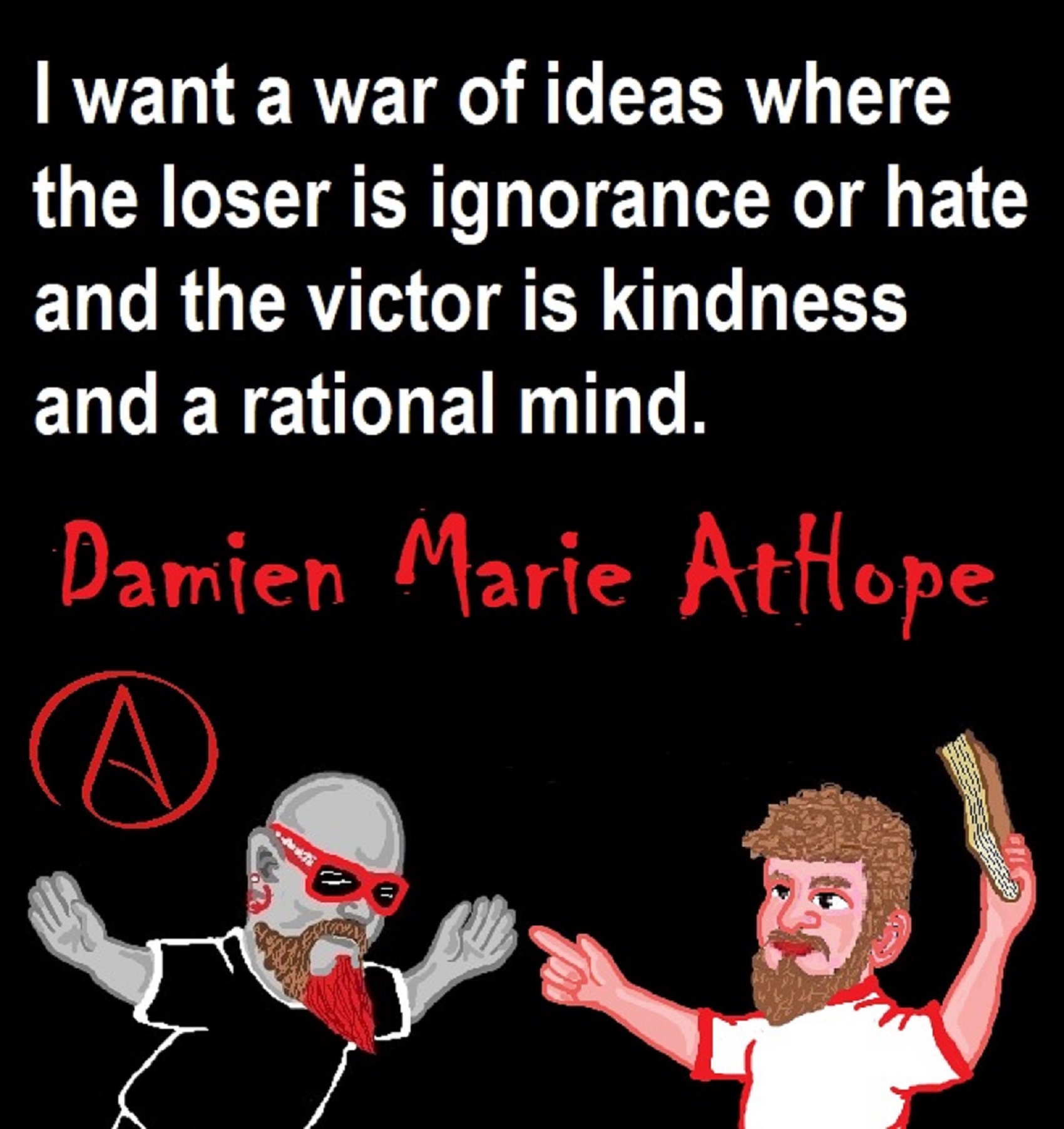


People don’t commonly teach religious history, even that of their own claimed religion. No, rather they teach a limited “pro their religion” history of their religion from a religious perspective favorable to the religion of choice.
We are like believing machines we vacuum up ideas, like Velcro sticks to almost everything. We accumulate beliefs that we allow to negatively influence our lives, often without realizing it. Our willingness must be to alter skewed beliefs that impend our balance or reason, which allows us to achieve new positive thinking and accurate outcomes.

To me, Animism starts in Southern Africa, then to West Europe, and becomes Totemism. Another split goes near the Russia and Siberia border becoming Shamanism, which heads into Central Europe meeting up with Totemism, which also had moved there, mixing the two which then heads to Lake Baikal in Siberia. From there this Shamanism-Totemism heads to Turkey where it becomes Paganism.

Do you truly think “Religious Belief” is only a matter of some personal choice?
Do you not see how coercive one’s world of choice is limited to the obvious hereditary belief, in most religious choices available to the child of religious parents or caregivers? Religion is more commonly like a family, culture, society, etc. available belief that limits the belief choices of the child and that is when “Religious Belief” is not only a matter of some personal choice and when it becomes hereditary faith, not because of the quality of its alleged facts or proposed truths but because everyone else important to the child believes similarly so they do as well simply mimicking authority beliefs handed to them. Because children are raised in religion rather than being presented all possible choices but rather one limited dogmatic brand of “Religious Belief” where children only have a choice of following the belief as instructed, and then personally claim the faith hereditary belief seen in the confirming to the belief they have held themselves all their lives. This is obvious in statements asked and answered by children claiming a faith they barely understand but they do understand that their family believes “this or that” faith, so they feel obligated to believe it too. While I do agree that “Religious Belief” should only be a matter of some personal choice, it rarely is… End Hereditary Religion!
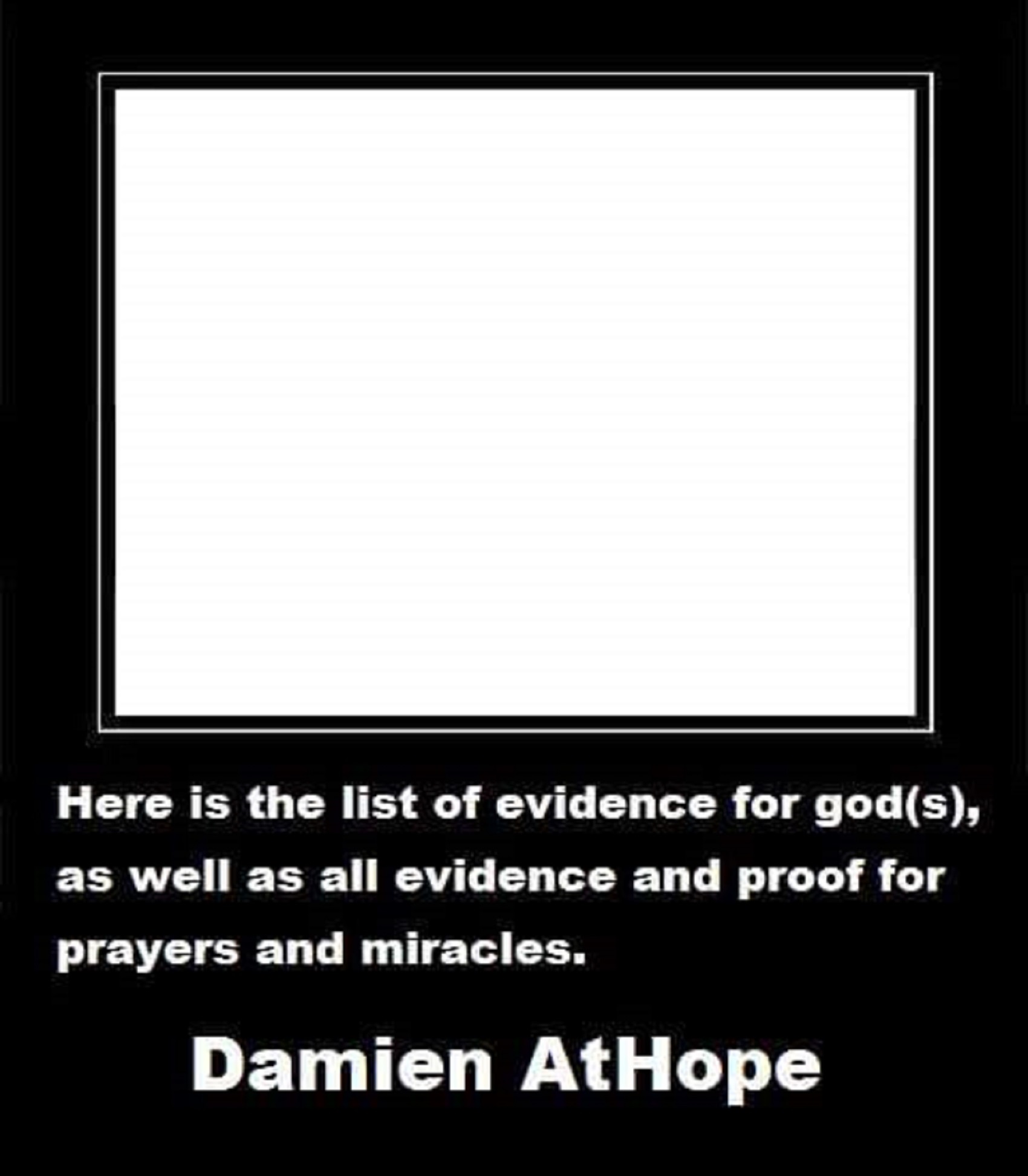
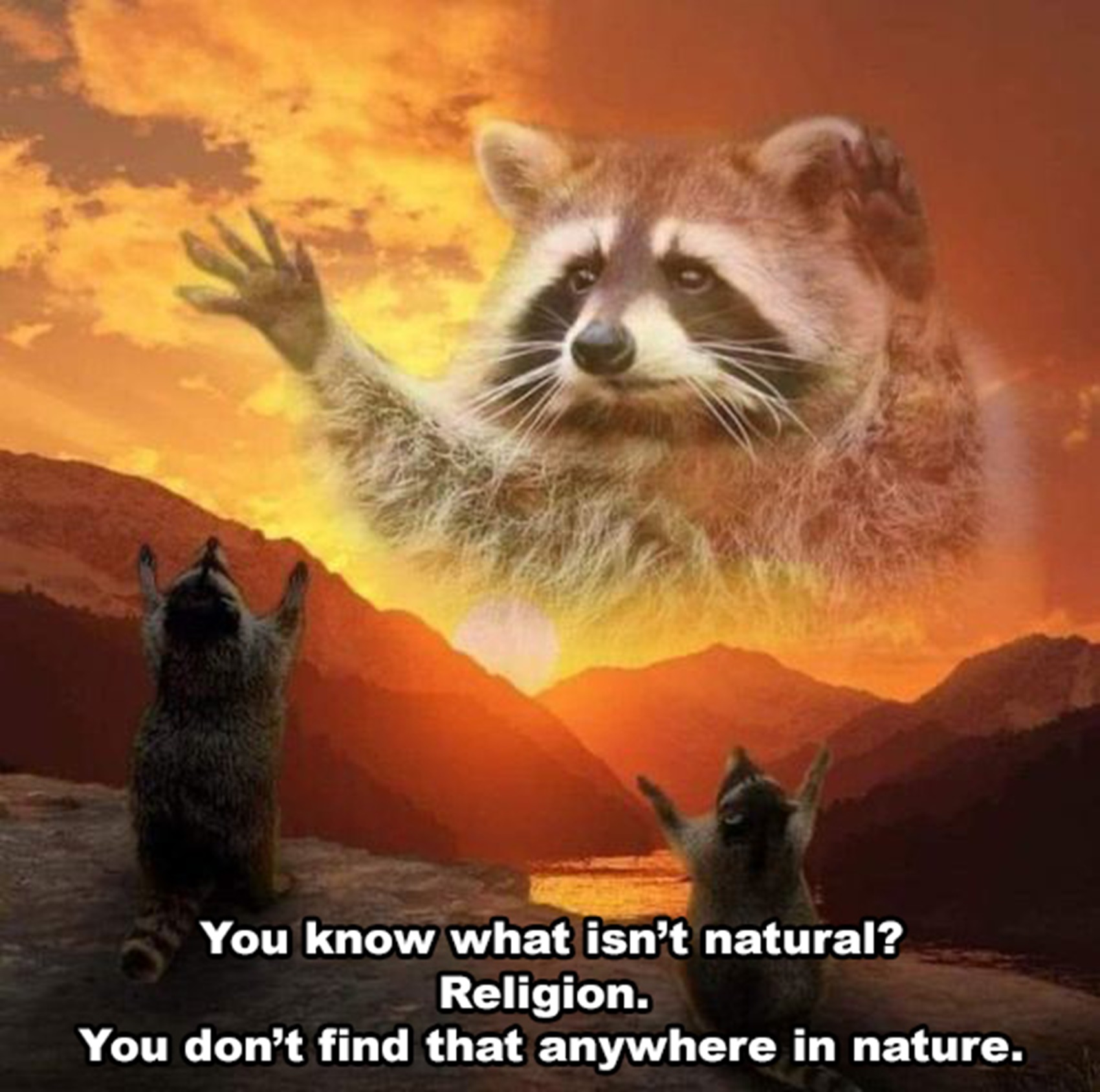
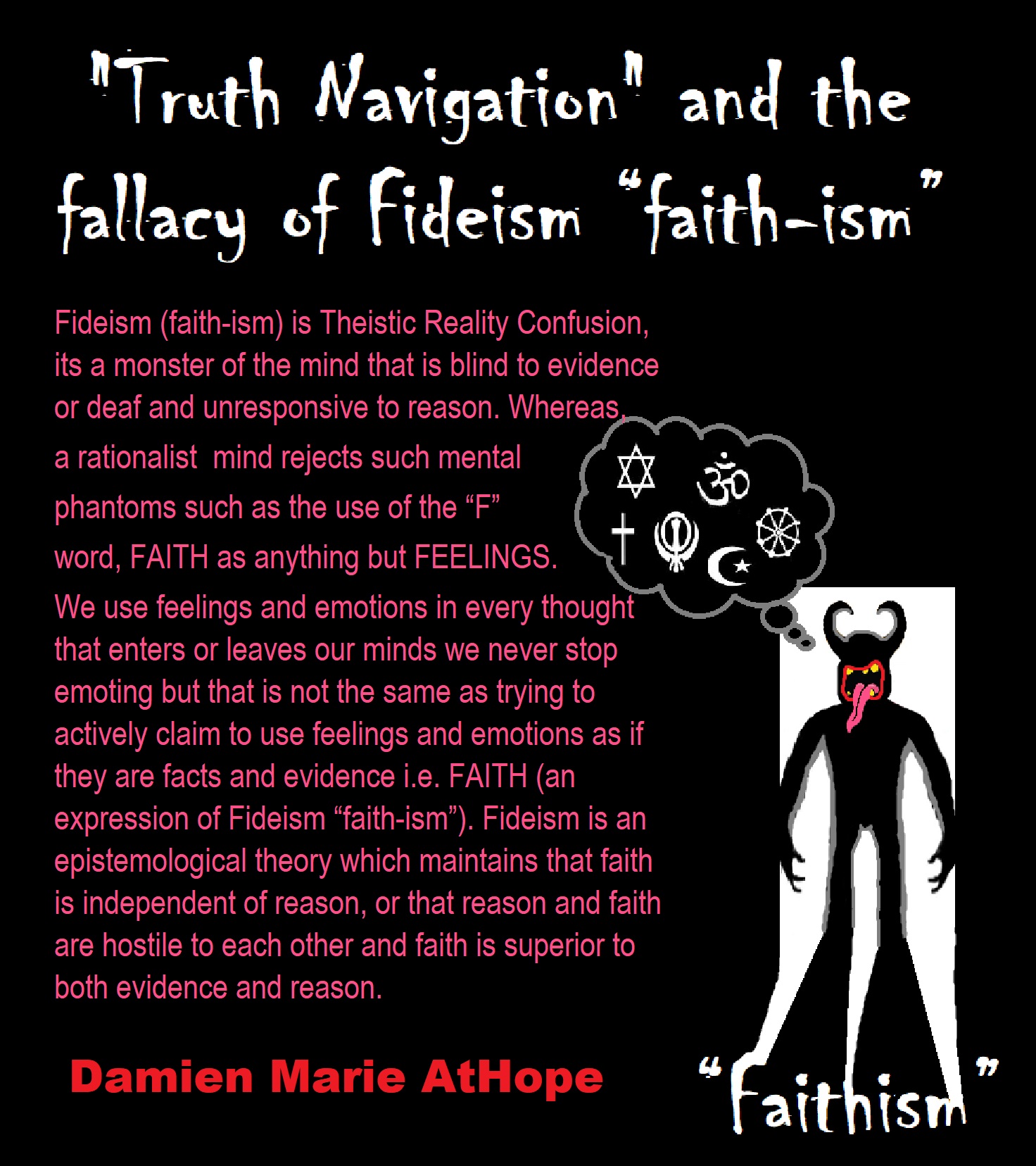
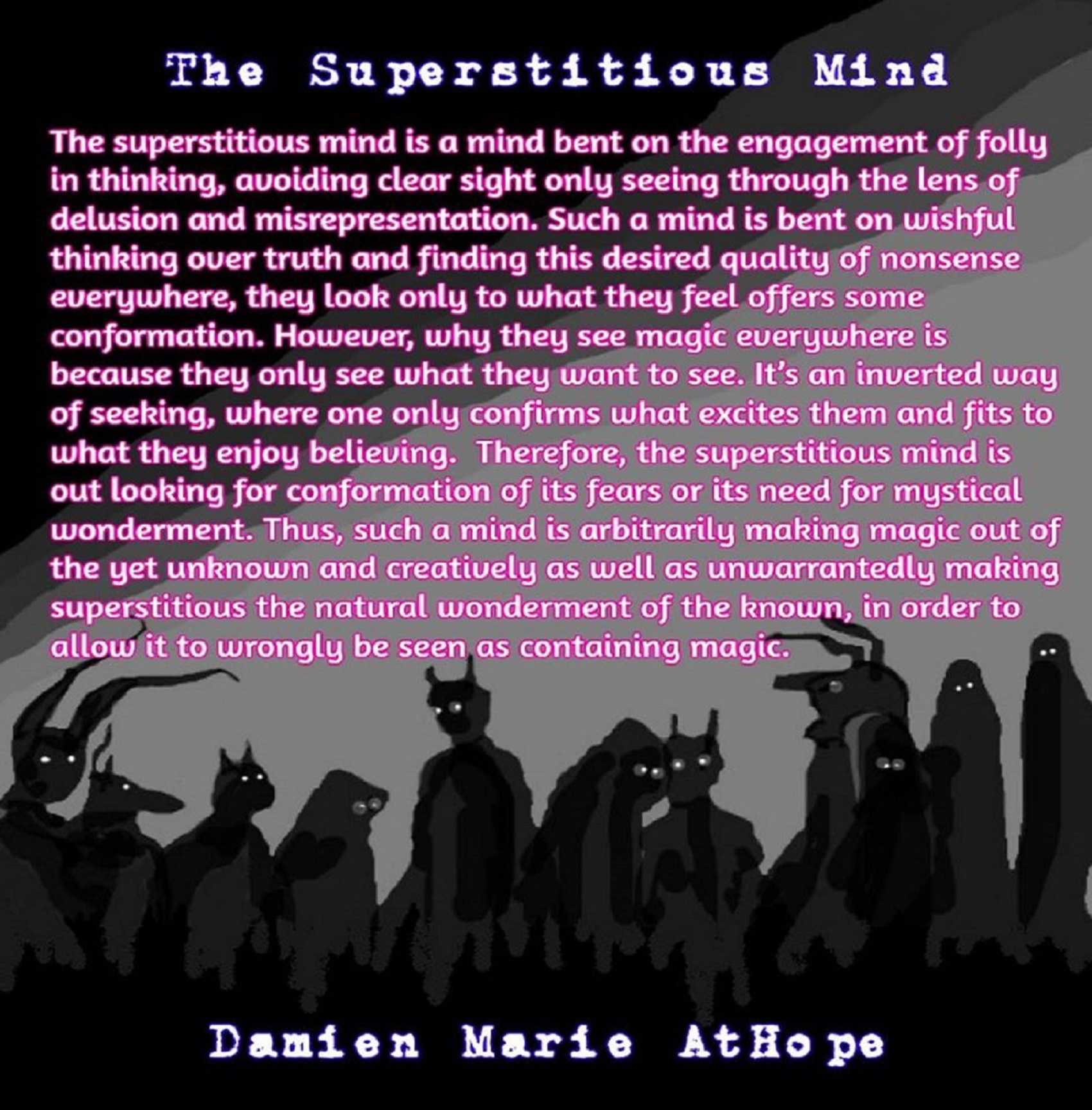
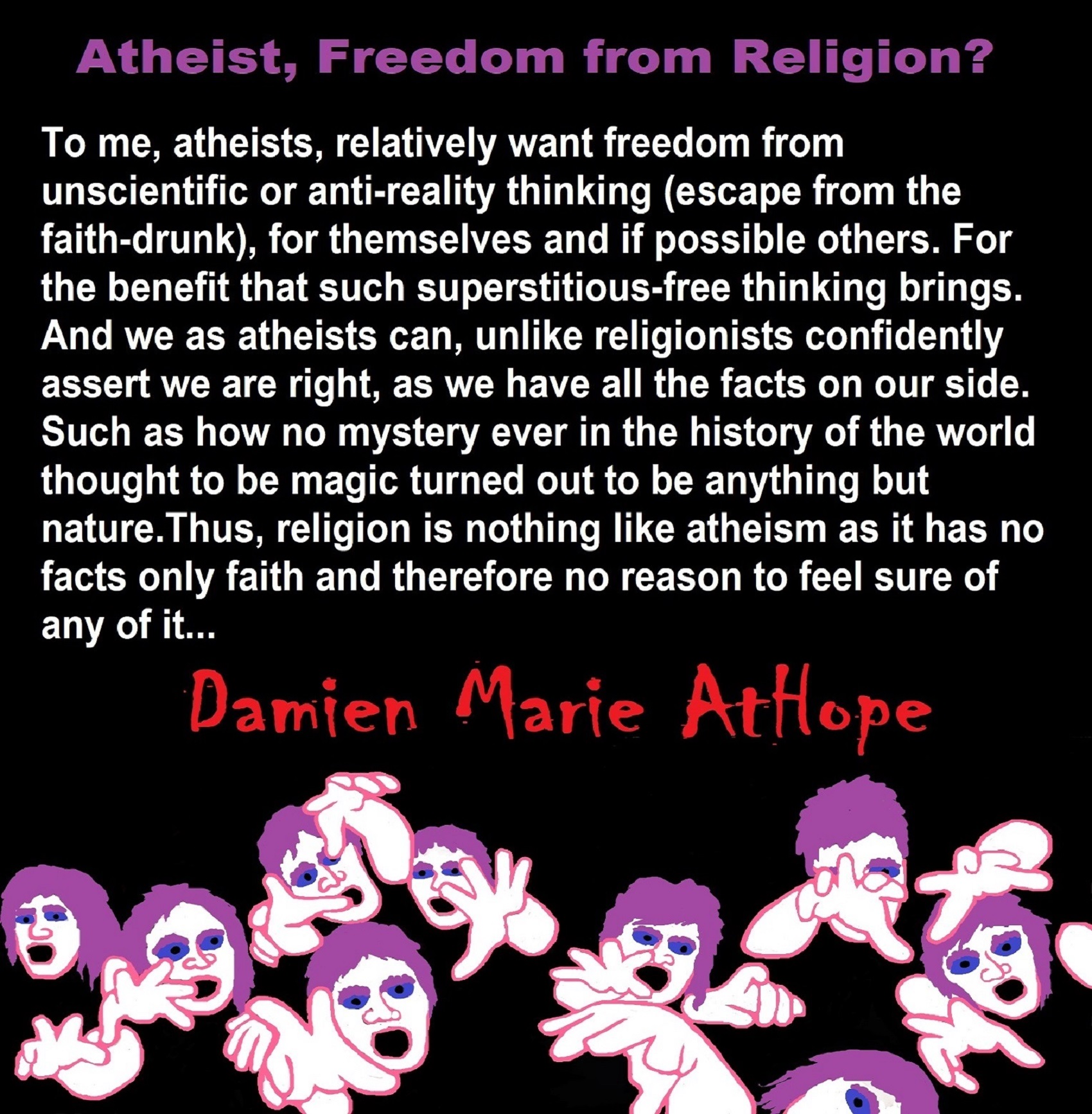

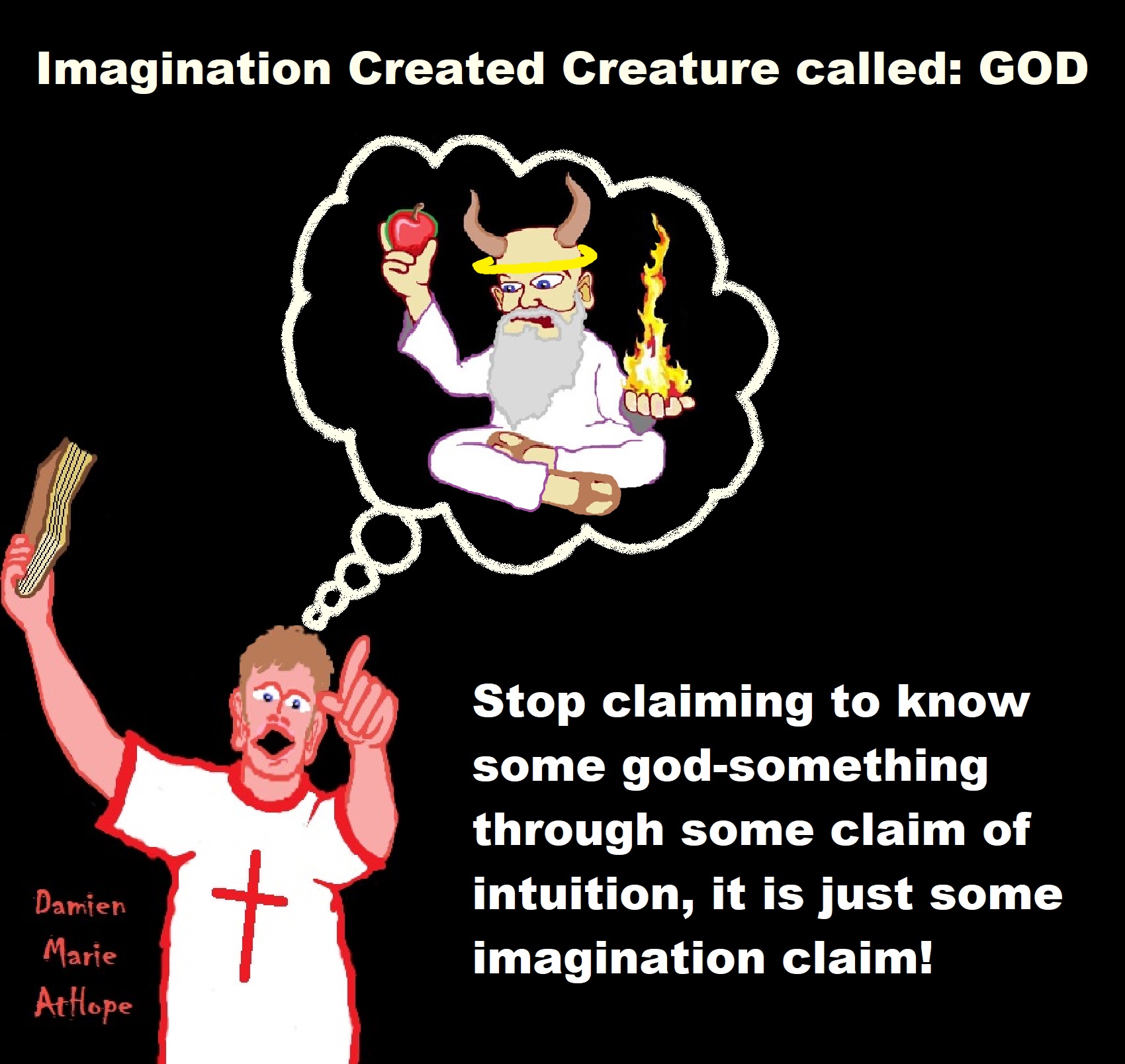
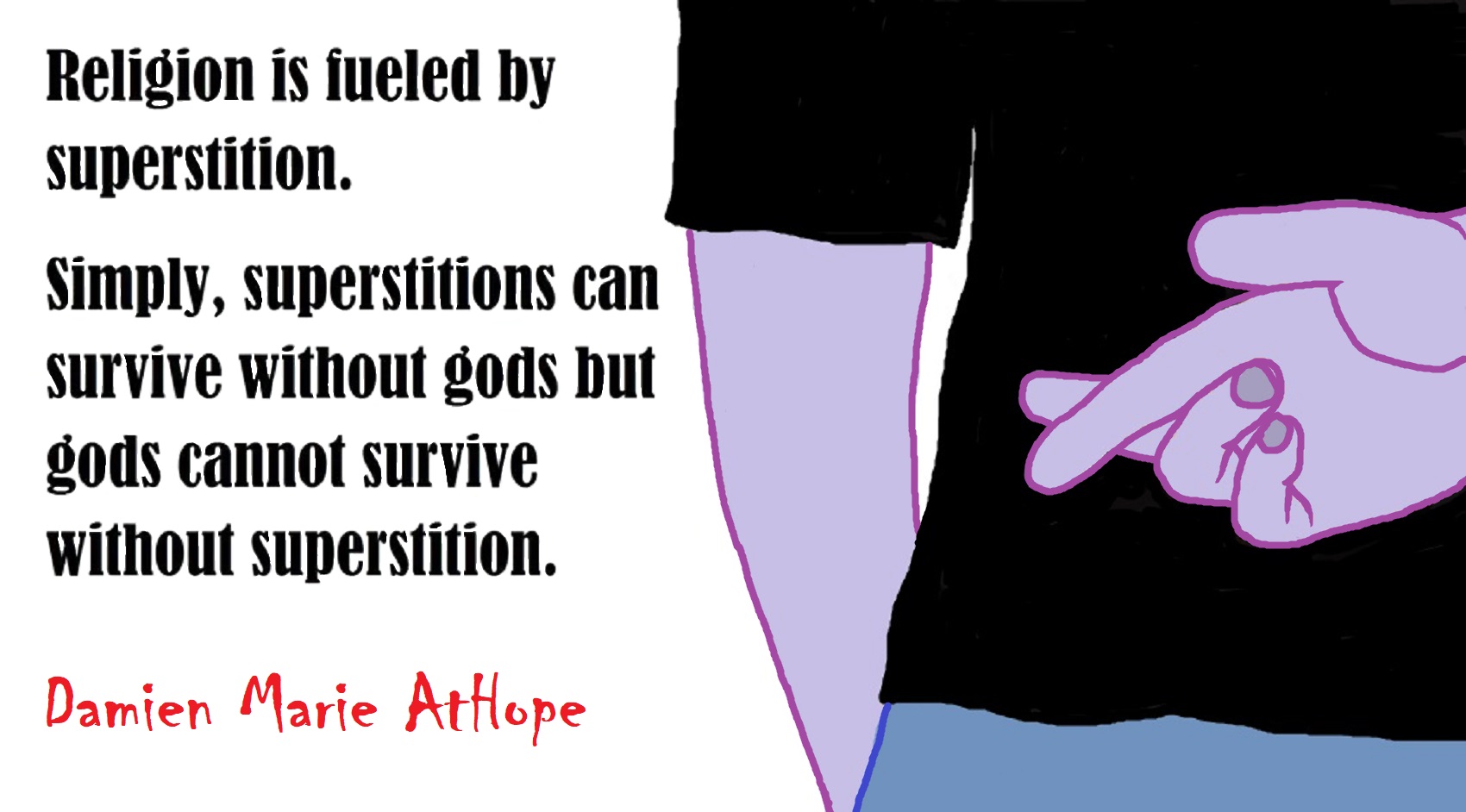
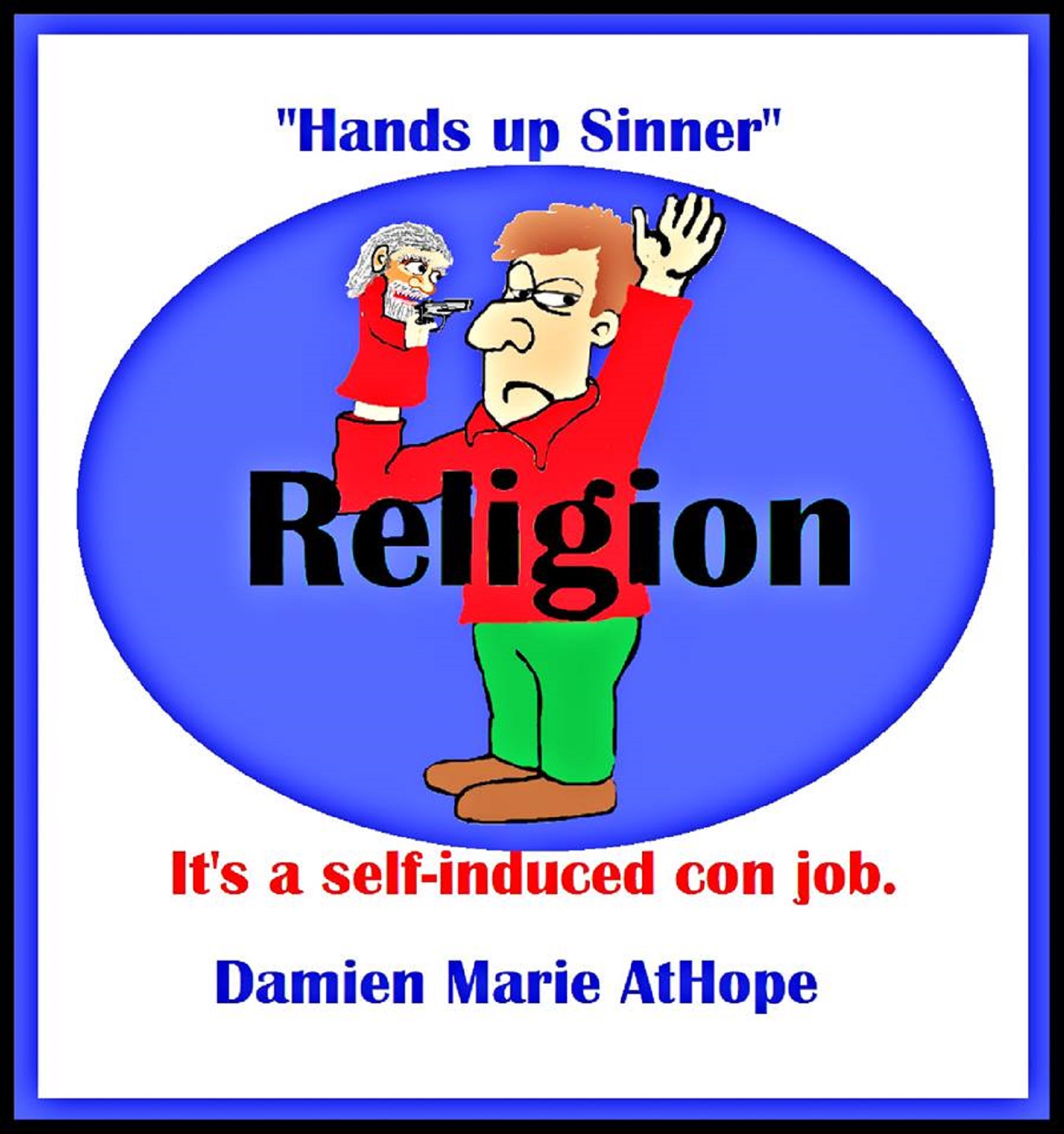
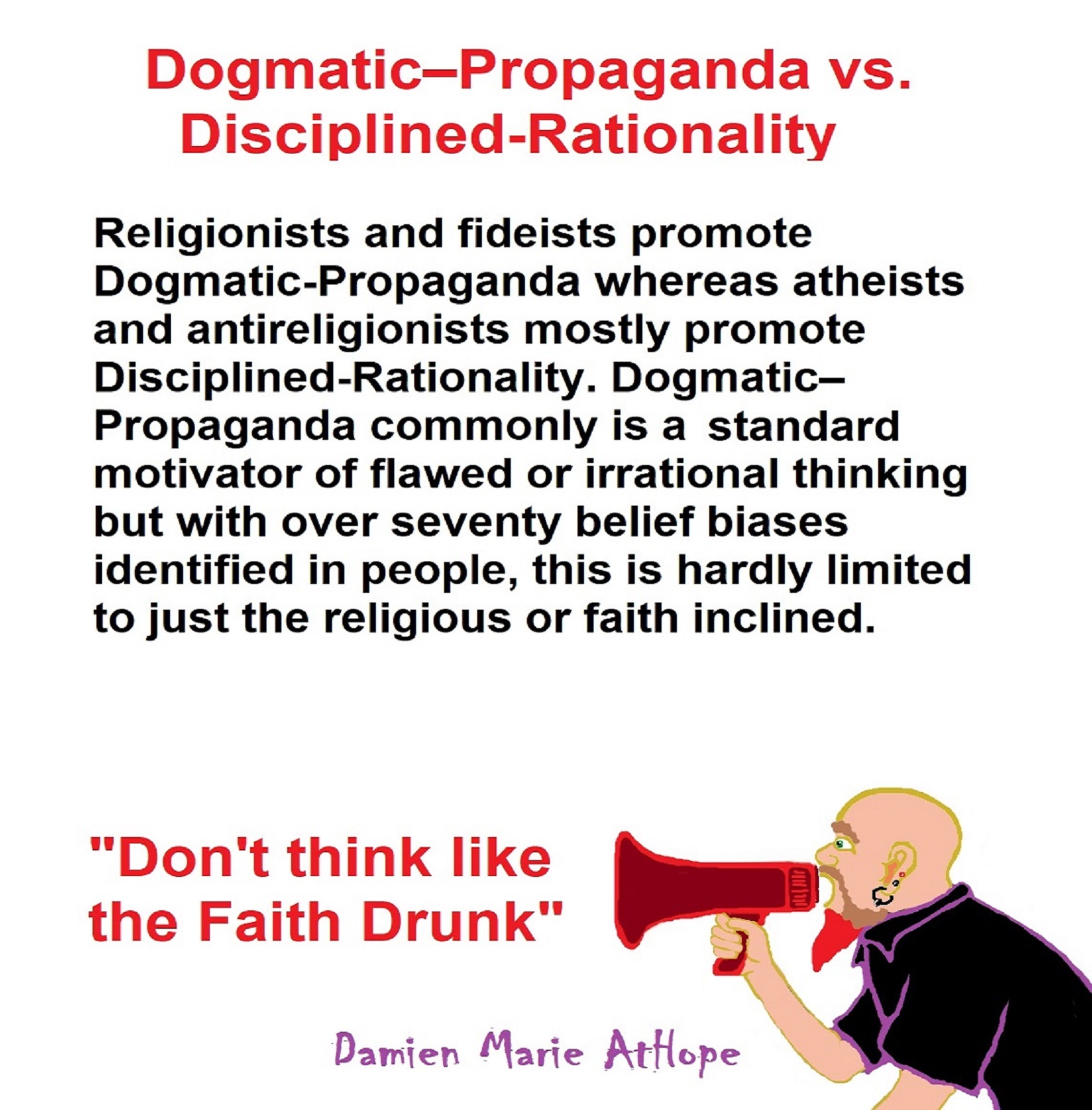
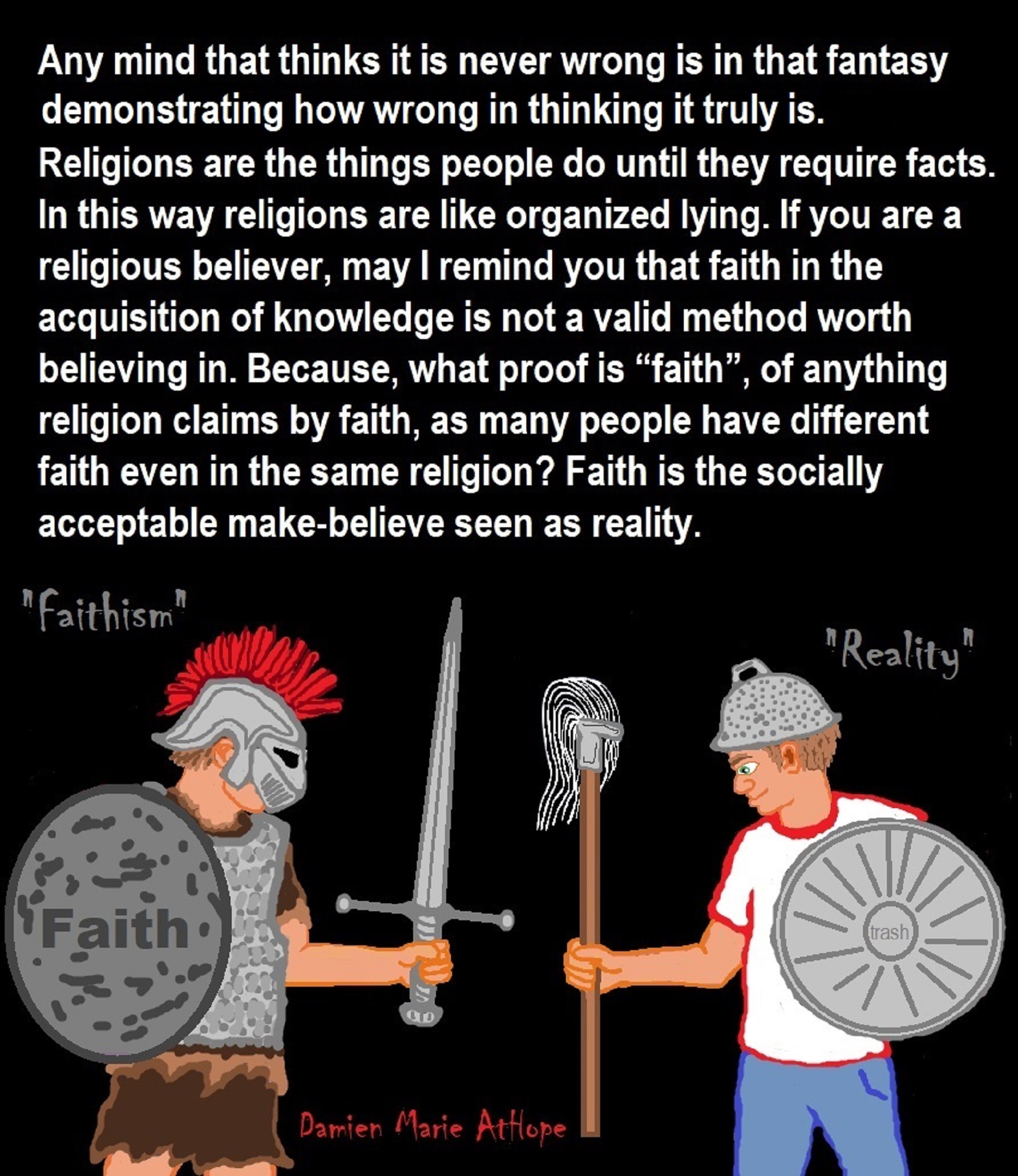

“Theists, there has to be a god, as something can not come from nothing.”
Well, thus something (unknown) happened and then there was something. This does not tell us what the something that may have been involved with something coming from nothing. A supposed first cause, thus something (unknown) happened and then there was something is not an open invitation to claim it as known, neither is it justified to call or label such an unknown as anything, especially an unsubstantiated magical thinking belief born of mythology and religious storytelling.


While hallucinogens are associated with shamanism, it is alcohol that is associated with paganism.
The Atheist-Humanist-Leftist Revolutionaries Shows in the prehistory series:
Show two: Pre-animism 300,000 years old and animism 100,000 years old: related to “Anarchism and Socialism”
Show tree: Totemism 50,000 years old: related to “Anarchism and Socialism”
Show four: Shamanism 30,000 years old: related to “Anarchism and Socialism”
Show five: Paganism 12,000 years old: related to “Anarchism and Socialism”
Show six: Emergence of hierarchy, sexism, slavery, and the new male god dominance: Paganism 7,000-5,000 years old: related to “Anarchism and Socialism” (Capitalism) (World War 0) Elite and their slaves!
Prehistory: related to “Anarchism and Socialism” the division of labor, power, rights, and recourses: VIDEO
Pre-animism 300,000 years old and animism 100,000 years old: related to “Anarchism and Socialism”: VIDEO
Totemism 50,000 years old: related to “Anarchism and Socialism”: VIDEO
Shamanism 30,000 years old: related to “Anarchism and Socialism”: VIDEO
Paganism 12,000 years old: related to “Anarchism and Socialism” (Pre-Capitalism): VIDEO
Paganism 7,000-5,000 years old: related to “Anarchism and Socialism” (Capitalism) (World War 0) Elite and their slaves: VIEDO
Paganism 5,000 years old: progressed organized religion and the state: related to “Anarchism and Socialism” (Kings and the Rise of the State): VIEDO
Paganism 4,000 years old: related to “Anarchism and Socialism” (First Moralistic gods, then the Origin time of Monotheism): VIEDO
I do not hate simply because I challenge and expose myths or lies any more than others being thought of as loving simply because of the protection and hiding from challenge their favored myths or lies.
The truth is best championed in the sunlight of challenge.
An archaeologist once said to me “Damien religion and culture are very different”
My response, So are you saying that was always that way, such as would you say Native Americans’ cultures are separate from their religions? And do you think it always was the way you believe?
I had said that religion was a cultural product. That is still how I see it and there are other archaeologists that think close to me as well. Gods too are the myths of cultures that did not understand science or the world around them, seeing magic/supernatural everywhere.
I personally think there is a goddess and not enough evidence to support a male god at Çatalhöyük but if there was both a male and female god and goddess then I know the kind of gods they were like Proto-Indo-European mythology.
This series idea was addressed in, Anarchist Teaching as Free Public Education or Free Education in the Public: VIDEO
Our 12 video series: Organized Oppression: Mesopotamian State Force and the Politics of power (9,000-4,000 years ago), is adapted from: The Complete and Concise History of the Sumerians and Early Bronze Age Mesopotamia (7000-2000 BC): https://www.youtube.com/watch?v=szFjxmY7jQA by “History with Cy“
Show #1: Mesopotamian State Force and the Politics of Power (Samarra, Halaf, Ubaid)
Show #2: Mesopotamian State Force and the Politics of Power
Show #3: Mesopotamian State Force and the Politics of Power (Uruk and the First Cities)
Show #4: Mesopotamian State Force and the Politics of Power (First Kings)
Show #5: Mesopotamian State Force and the Politics of Power (Early Dynastic Period)
Show #6: Mesopotamian State Force and the Politics of Power
Show #7: Mesopotamian State Force and the Politics of Power (Sargon and Akkadian Rule)
Show #9: Mesopotamian State Force and the Politics of Power (Gudea of Lagash and Utu-hegal)
Show #12: Mesopotamian State Force and the Politics of Power (Aftermath and Legacy of Sumer)

The “Atheist-Humanist-Leftist Revolutionaries”
Cory Johnston ☭ Ⓐ Atheist Leftist @Skepticallefty & I (Damien Marie AtHope) @AthopeMarie (my YouTube & related blog) are working jointly in atheist, antitheist, antireligionist, antifascist, anarchist, socialist, and humanist endeavors in our videos together, generally, every other Saturday.
Why Does Power Bring Responsibility?
Think, how often is it the powerless that start wars, oppress others, or commit genocide? So, I guess the question is to us all, to ask, how can power not carry responsibility in a humanity concept? I know I see the deep ethical responsibility that if there is power their must be a humanistic responsibility of ethical and empathic stewardship of that power. Will I be brave enough to be kind? Will I possess enough courage to be compassionate? Will my valor reach its height of empathy? I as everyone, earns our justified respect by our actions, that are good, ethical, just, protecting, and kind. Do I have enough self-respect to put my love for humanity’s flushing, over being brought down by some of its bad actors? May we all be the ones doing good actions in the world, to help human flourishing.
I create the world I want to live in, striving for flourishing. Which is not a place but a positive potential involvement and promotion; a life of humanist goal precision. To master oneself, also means mastering positive prosocial behaviors needed for human flourishing. I may have lost a god myth as an atheist, but I am happy to tell you, my friend, it is exactly because of that, leaving the mental terrorizer, god belief, that I truly regained my connected ethical as well as kind humanity.
Cory and I will talk about prehistory and theism, addressing the relevance to atheism, anarchism, and socialism.
At the same time as the rise of the male god, 7,000 years ago, there was also the very time there was the rise of violence, war, and clans to kingdoms, then empires, then states. It is all connected back to 7,000 years ago, and it moved across the world.
Cory Johnston: https://damienmarieathope.com/2021/04/cory-johnston-mind-of-a-skeptical-leftist/?v=32aec8db952d
The Mind of a Skeptical Leftist (YouTube)
Cory Johnston: Mind of a Skeptical Leftist @Skepticallefty
The Mind of a Skeptical Leftist By Cory Johnston: “Promoting critical thinking, social justice, and left-wing politics by covering current events and talking to a variety of people. Cory Johnston has been thoughtfully talking to people and attempting to promote critical thinking, social justice, and left-wing politics.” http://anchor.fm/skepticalleft
Cory needs our support. We rise by helping each other.
Cory Johnston ☭ Ⓐ @Skepticallefty Evidence-based atheist leftist (he/him) Producer, host, and co-host of 4 podcasts @skeptarchy @skpoliticspod and @AthopeMarie
Damien Marie AtHope (“At Hope”) Axiological Atheist, Anti-theist, Anti-religionist, Secular Humanist. Rationalist, Writer, Artist, Poet, Philosopher, Advocate, Activist, Psychology, and Armchair Archaeology/Anthropology/Historian.
Damien is interested in: Freedom, Liberty, Justice, Equality, Ethics, Humanism, Science, Atheism, Antiteism, Antireligionism, Ignosticism, Left-Libertarianism, Anarchism, Socialism, Mutualism, Axiology, Metaphysics, LGBTQI, Philosophy, Advocacy, Activism, Mental Health, Psychology, Archaeology, Social Work, Sexual Rights, Marriage Rights, Woman’s Rights, Gender Rights, Child Rights, Secular Rights, Race Equality, Ageism/Disability Equality, Etc. And a far-leftist, “Anarcho-Humanist.”
I am not a good fit in the atheist movement that is mostly pro-capitalist, I am anti-capitalist. Mostly pro-skeptic, I am a rationalist not valuing skepticism. Mostly pro-agnostic, I am anti-agnostic. Mostly limited to anti-Abrahamic religions, I am an anti-religionist.
To me, the “male god” seems to have either emerged or become prominent around 7,000 years ago, whereas the now favored monotheism “male god” is more like 4,000 years ago or so. To me, the “female goddess” seems to have either emerged or become prominent around 11,000-10,000 years ago or so, losing the majority of its once prominence around 2,000 years ago due largely to the now favored monotheism “male god” that grow in prominence after 4,000 years ago or so.
My Thought on the Evolution of Gods?
Animal protector deities from old totems/spirit animal beliefs come first to me, 13,000/12,000 years ago, then women as deities 11,000/10,000 years ago, then male gods around 7,000/8,000 years ago. Moralistic gods around 5,000/4,000 years ago, and monotheistic gods around 4,000/3,000 years ago.
To me, animal gods were likely first related to totemism animals around 13,000 to 12,000 years ago or older. Female as goddesses was next to me, 11,000 to 10,000 years ago or so with the emergence of agriculture. Then male gods come about 8,000 to 7,000 years ago with clan wars. Many monotheism-themed religions started in henotheism, emerging out of polytheism/paganism.
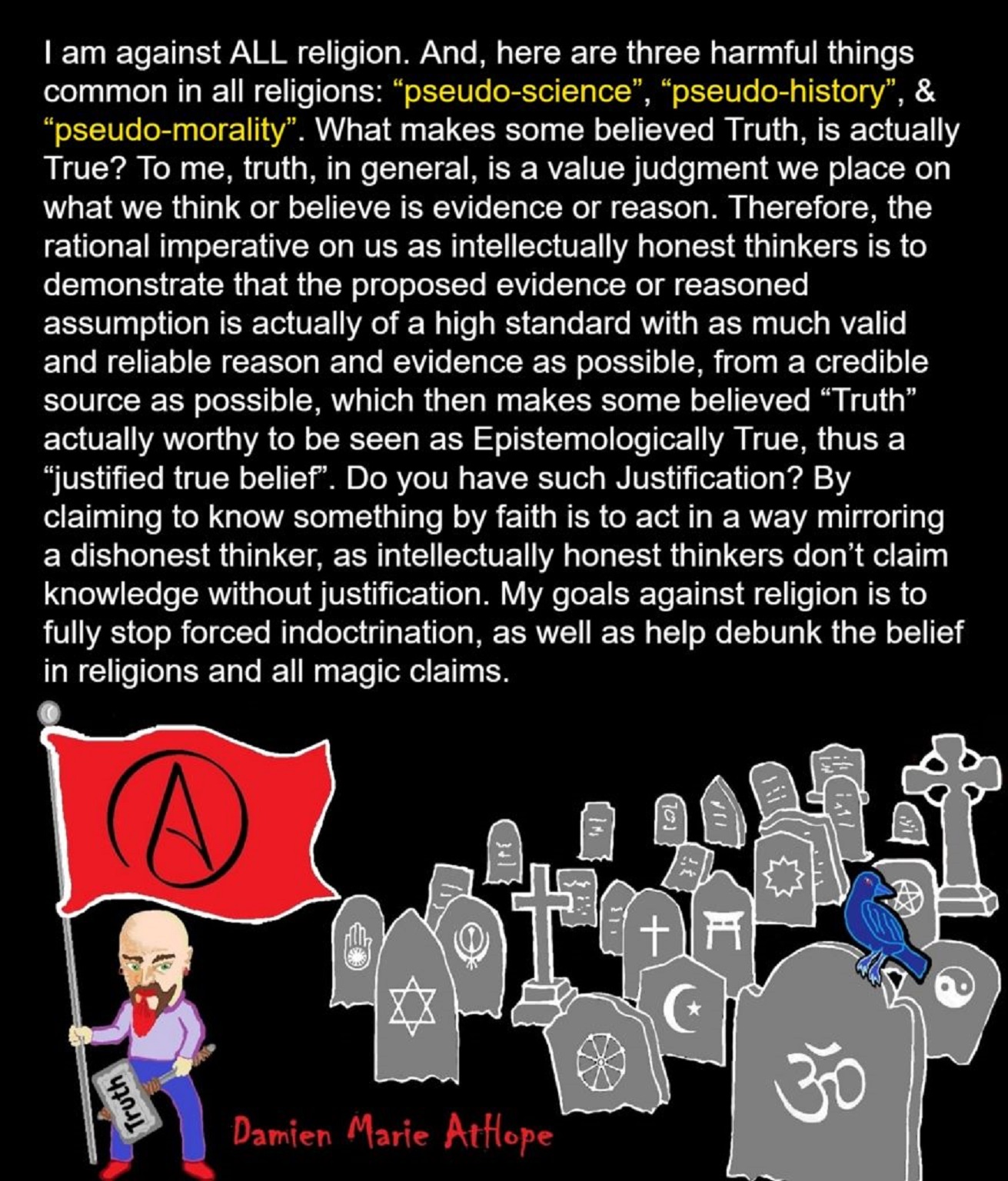

Damien Marie AtHope (Said as “At” “Hope”)/(Autodidact Polymath but not good at math):
Axiological Atheist, Anti-theist, Anti-religionist, Secular Humanist, Rationalist, Writer, Artist, Jeweler, Poet, “autodidact” Philosopher, schooled in Psychology, and “autodidact” Armchair Archaeology/Anthropology/Pre-Historian (Knowledgeable in the range of: 1 million to 5,000/4,000 years ago). I am an anarchist socialist politically. Reasons for or Types of Atheism
My Website, My Blog, & Short-writing or Quotes, My YouTube, Twitter: @AthopeMarie, and My Email: damien.marie.athope@gmail.com

